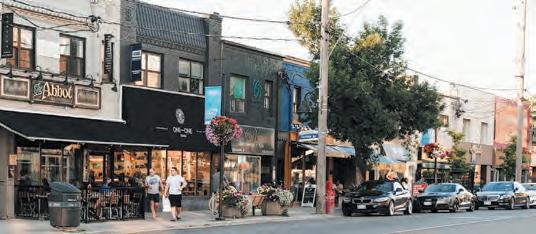













































































































































Stand taller. Move with ease. Age with grace.
Rolfing® Structural Integration helps improve posture, mobility, and balance. It can alleviate pain by addressing root causes of imbalance.
Rolfing ® treatments are covered under extended benefits.
Benefits:
- Alleviates pain and discomfort
- Promotes better posture
- Increases mobility
- Enhances overall balance

Charlene Yeh, RMT, Certified Advanced Rolfer,® M.Mus
torontorolfing.com 647-863-2403
torontorolfing@gmail.com






































































This month marks the 55th Earth Day, but things are different this time around. Now, our planet seems to have taken a back seat to everything.
What happened? Well, a misguided reality TV star–cum-politician has decided nothing matters beyond the pursuit of the all-mighty dollar.
So what do we do about it?
Decades ago, when I was protesting for environmental protection, one of the arguments was that we shouldn’t destroy these natural resources that took hundreds of years or longer to grow just to ship overseas or south of the border to turn into cheap products. We should invest in value-added manufacturing and make things here.
We were anti-globalism because free trade agreements had a way of circumventing environmental regulations and other
protections in our country, including good union jobs. The theory was that it would erode sovereignty and make us more economically reliant on America and other countries.
We read books like Small is Beautiful that said unchecked economic growth at the expense of everything else would lead to our ruin.
A smart person once said to think globally but act locally. I think that is truer now than ever before. We can’t take our eyes off of what is happening, but we can concentrate on the decisions we make every day: transportation, food, recreation, our clothes and from which faraway land they are shipped.
Finally, we need to understand that infinite growth is not possible in a finite world. Something has to give.
—Ron Johnson


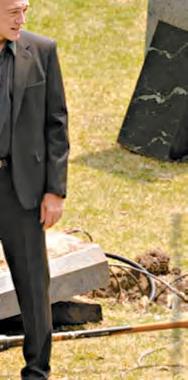
David Cronenberg on his new film, childhood cinema and the importance of a good laugh
Toronto filmmaker David Cronenberg is back this month with his latest film, The Shrouds. It’s a film, out April 25, that combines cutting-edge technology, burials, grief, conspiracy theories and, yes, love. Here’s our interview:
Am I crazy or does the lead actor (Vincent Cassell) bear a striking resemblance to you?
Well, I have to stress that I did not cast Vincent Cassell because of his hair. It does look a little like mine, but really, when you look at Vincent carefully, you'll see that he looks nothing like me. But there is, it's true, a sort of a weird resemblance.
What inspired the film originally, and how personal a story is it for you?
Well, certainly, I wouldn't have made this if my wife of 43 years hadn't died in 2017. So definitely it was my response to that, and my dealing with that was the genesis of the project. But then once you establish that, it becomes something else. As soon as you start writing it, it becomes fiction.
OK, so it wasn’t too hard to handle for you once you turn the cameras on?




lived in Toronto, so it was very exciting for me to be able to shoot the film here and have it be a Toronto-based movie with various restaurants and things. There's even a scene at a restaurant, and across the road you can see out the window is the Royal Cinema, which was, under the name the Pylon, my childhood cinema, and I would go there every Saturday and watch movies.
Does the film reflect any of your own beliefs in terms of religion and atheism?
My lead character is basically, yes, he’s an atheist, he's an existentialist, and he makes that very clear and that his interest in burial in religions is basically because he is introducing a new kind of burial, and that is always inevitably connected with various cultures and various religions.
“FIRST OF ALL, I THINK THE MOVIE IS FUNNY. I THINK ALL OF MY MOVIES ARE FUNNY.”
Despite the fact that there are some very potent emotional scenes in the movie, for me, it's not suddenly like I should be curled up in a ball in the corner. It's technical. You know, you're worried about the lighting, the sound, the framing, what lens are you using. And so there's distance. However passionate you are about the project, you need distance to create the art.
Tell us about some of the personal elements incorporated into the film. The people that I might have cannibalized for the characters, I will say nothing. But, yes, it's a very Toronto movie. I've always
What are you hoping people take from the film?
First of all, I think the movie's funny. I think all of my movies are funny. If Torontonians don't get the humour, then I don't know who will. So there's that. It's my approach to life. Without humour, I don't know how we would possibly exist in this world.
I caught your daughter Caitlin’s first feature last year. How does it feel to have three filmmakers in the family? Fantastic. Well, yeah, even my oldest daughter, Cassandra, has actually made a movie as well (so, four). So it feels just very comfortable and inevitable. I knew that Cate would do that. I mean, she was always a photographer right from a very young age. She has a great eye, and she has a great sense of drama, so I wasn't surprised to see that she could handle it.
—Ron Johnson
Here’s what savvy locals need to know about finding a public toilet in the city.


Spring is here, the grass has riz, but do you know where a public washroom is? Here are a few tips:
GoHere
This washroom locator app was developed by Crohn’s and Colitis Canada to show available public toilets.
GottaGoTO Toronto Public Space Committee, which has done incredible work on the washroom advocacy front, also offers a searchable Google Maps–based washroom locator. The group is also initiating a public toilet design competition underway right now, dubbed TOtheLoo.
Hotel lobbies
Fresh from a downtown commute at Union Station and nature’s call has turned to a shriek, a little birdie told us the lobby bathroom at the Royal York is one of the finest in town. Shh.









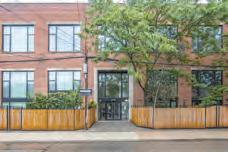
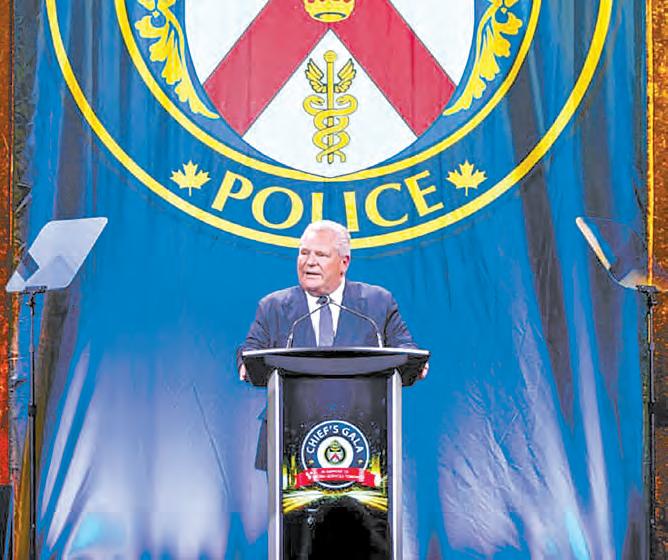
The law is clear: Police are not allowed to endorse politicians
Here’s some city news to take your mind off the chaos and confusion Donald Trump is causing Canadians and the rest of the world. But this city news is not comforting.
On Feb. 18, in the midst of the provincial election, and just a day after after the leaders' debate, the Toronto Police Association, as well as the Police Association of Ontario and the Ontario Provincial Police Association, publicly endorsed Doug Ford on social media.
The law is very clear that police are prohibited from endorsing candidates in an election: in a democracy police cannot be partisan. Regulation 402/23 under the Community Safety and Policing Act states the prohibition clearly.
Section 6 of the regulation reads: “If authorized to do so by the chief of police a police officer may, on behalf of a police service, express views on any issue, as long as the police officer does not, during an election campaign, express views supporting or opposing a candidate in the election or a political party.”
Fifteen years ago, after the police association had been engaged in a flurry of election endorsements, the
Toronto Police Service Board “adopted the proposition that Members of the Toronto Police Association and/or its Executive are subject to the Police Services Act and its Regulations and are, therefore, like every municipal police officer, prohibited from endorsing or opposing candidates in an election.”
Toronto Police Service Board maintains that although members of the Toronto Police Association’s executive are on leave from the force, they remain bound by the Police Services Act’s Code of Conduct and the authority of the chief of police.
The board emphasizes that police officers, including association members, are prohibited from endorsing or opposing political candidates, and the chief is responsible for reinforcing this policy at the start of each election campaign. Any violations will result in disciplinary action.
When asked what the Toronto Police Service Board has done about this endorsement, the chair of the board, city councillor Shelley Carroll, washed her hands of the issue.
“The Board is aware of the endorsement made by the Toronto Po-
We've known for decades that lead is toxic and particularly dangerous for children, so why is it still showing up in drinking water tests at Ontario schools?
There is no safe level of exposure to lead. Even at very low levels of exposure, lead can impact children’s developing brains, causing decreased IQ, decreased attention span, motor skill weaknesses and behavioural problems.
The Canadian Environmental Law Association (CELA) used publicly available data to rank the 15 public school boards and schools with the highest number of water tests that exceeded the provincial limit on lead.
The Toronto District School Board (TDSB) ranks third in the province. Other Toronto-area school boards made the list, including the York Catholic and York Region District School Boards, which ranked seventh and 12th.
lice Association. The Board does not have the authority to discipline police officers. The Board’s policy on political activity was created under the Police Services Act. In light of the enactment of the Community Safety and Policing Act, 2019, the Board is currently reviewing the policy.”
Regulations adopted by the police board in the past continue to apply to the Toronto Police Services Board under the 2019 legislation. You would think the board would ask the chief of police, Myron Demkiw, whether he had begun disciplinary action as required by the Board policy, but who knows whether that has happened. Chief Demkiw has not responded to a request to indicate what if anything he is doing.
Living in a city with a politicized police force favouring one political party is hardly reassuring. The Police Service Board and Chief Demkiw need to show some leadership on this basic principle of democracy.

The average TDSB school is approximately 60 years old, meaning they were built before lead plumbing components were phased out. For nearly 20 years, Ontario’s regulation aimed at preventing lead exposure in schools and child care facilities has allowed for old lead infrastructure to be left in place after it is found. Instead of prioritizing effective solutions, such as removing lead or installing a filter, the regulation allows for the use of outdated band-aid measures, such as flushing water through a problem tap or fountain once daily. School boards are following the rules laid out by the province, but the status quo isn’t good enough.
Lead is not a problem that is going to get better with time. Aging infrastructure, rising temperatures and changes to drinking water chemistry are all factors that cause the lead components to release more lead into the water than they did before.
School boards deserve to have access to the resources they need to keep their schools in good condition and their community safe. The provincial government has a clear responsibility to make sure public schools are safe and healthy learning environments.
Despite lacking adequate support from the province, there are steps that we can take now to protect school children and advocate for change.
Community members and school board officials can help by clearly stating their support for getting lead out of schools and making it clear to the province that they want dedicated funding to make this happen. School boards can voluntarily take steps to improve transparency by posting all lead test results online and, where feasible, adopt the most recent best practices for preventing exposure when lead is found.








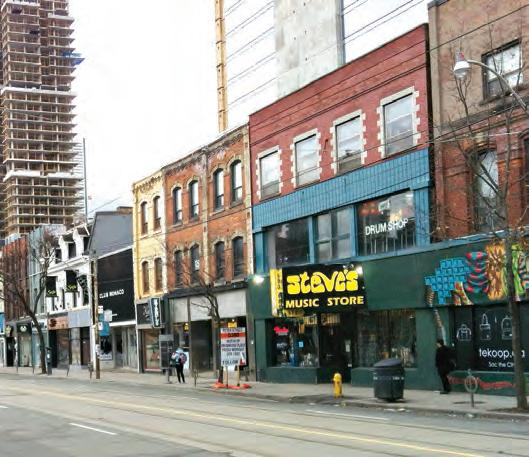
For decades, Queen West, from John to the Spadina area, was Toronto’s fashion and culture hub. Indie boutiques thrived alongside street vendors, and the strip’s gritty, creative energy made it a magnet for shoppers and artists alike. But today, many of those businesses are gone, and some say the Queen strip is losing its identity.
The latest blow came with the sudden closure of Vancouverbased streetwear brand Reigning Champ’s Queen West store. The company chose not to renew its lease this month, citing a declining retail scene and looming subway construction.
“It’s not necessarily a shopping district anymore,” an employee at their Ossington location explained.
These comments reflect a growing discussion in the city about Queen West’s uncertain future. Once a cultural and shopping hot spot that attracted both tourists and locals, the strip has become a shell of its former self.
Some argue that the very bigbox stores now shutting their doors helped fuel this decline — pushing out independent retailers and making it harder for small businesses to survive.
Now, even the corporate brands that replaced those independents are leaving.
Reigning Champ joins a growing list of major retailers — H&M, Zara, Adidas and Anthropologie — that have abandoned Queen West in the past two years. Rising rents, changing shopping habits and upcoming subway construction are accelerating the exodus.
The shift isn’t new. The Queen strips transformation began in the late 2000s when chain stores moved in, gradually replacing the independent shops and music venues that once defined the street. By 2014, Vogue praised West Queen West as one of the world’s coolest streets, but the original Queen West strip from University Avenue to Bathurst Street was left out of the conversation.
Meanwhile, CP24’s departure from its longtime headquarters at Queen and John Street in November further underscores the street’s changing landscape. Though live music still thrives at venues like the Horseshoe and Rivoli, Queen West is no longer the indie shopping and arts destination it once was.
As subway construction and rising costs continue to reshape the area, the question remains: what’s next for Queen? For now, the LiveEye truck still spins above the street, a relic of a once-thriving scene in flux. —Ron Johnson
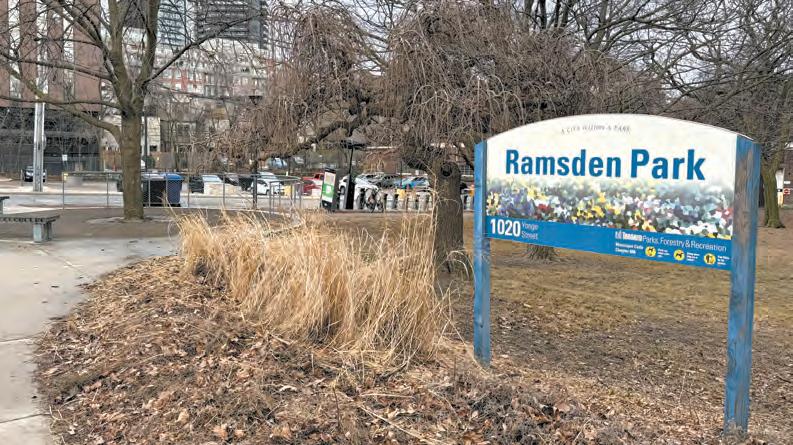
A new recreation centre is coming to Toronto’s Rosedale community.
The Ramsden Park Community Recreation Centre will be nestled at 1020 Yonge St., immediately to the west of Rosedale subway station and conveniently accessible near Yonge Street and Belmont Avenue (by the site of the now defunct Green P parking facility, Car Park 269).
Visitors can expect an aquatics centre with a six-lane, 25-metre pool and leisure pool; a gymnasium equipped with a running track; and multi-use activity spaces. The centre will also offer Wi-Fi access throughout and is being designed to meet accessibility and net zero emissions targets.
For the new Ramsden Park Community Recreation Centre, the project kickoff event was scheduled for late March.
“The objective of the launch is to educate the public about the project, the design process for the community recreation centre and the proposed community engagement plan,” said Alexandra Dinsmore, a City of Toronto spokesperson. “The event will help set the stage and build excitement for these initiatives and foster the spirit of collaboration.”
The event was to feature remarks from the project team and city councillor, presentations on the design process and a report on emerging themes.
“The launch will ideally drive engagement participation, which is key to the success of this initiative,” Dinsmore added.
The project will involve three main phases of community engagement spanning, from spring of this year to summer
“It’s a big picture statement that should inspire everyone.”
2026. Right now, the city is searching for a design team, but the next step involves working with the community and project advisory groups to guide the development of the project. For locals looking for more info about the project, the city is inviting residents to attend a project kickoff event.
“The vision [for the facility] is co-created with the community to describe the ideal future community recreation
centre,” the project’s mandate states. “It is a big-picture statement that should inspire everyone toward a common understanding of the project’s overall goals and objectives.”
In addition to committee meetings, the city will gather public input through Indigenous sharing circles, online surveys, in-person pop-up events and open houses.
Construction on the centre is expected to start in spring 2027, with the opening targeted for summer 2030 (of course, this timeline is flexible based on community feedback and design development).
Other construction projects in the area that are near completion include accessibility improvements to Rosedale subway station and replacing the Glen Road Pedestrian Bridge (across the Rosedale Valley Ravine) and pedestrian tunnel under Bloor Street East.
These projects are expected to be complete by this spring to mid 2025. In addition, Avenue Road improvements already underway are scheduled to include a new pedestrian entryway to Ramsden park.
—Nisean Lorde


















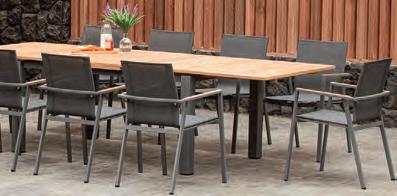
Geary Avenue Park will be closed for construction beginning this spring. The park’s expansion will transform a segment of the hydro corridor running parallel to Geary Avenue into new park space. Streetscape improvements will link the expanded Geary Avenue Park to the existing Bartlett Parkette at Salem Avenue.
Once complete, residents can expect the park to have a ton of new features, including entry plazas, better lighting, a fenced-in, off-leash dog area, various seating options, picnic tables and more. There will also be an open lawn, meadow plantings and shrubs as well as widened sidewalks on some sections of Geary Avenue.
Construction is expected to be complete later this year, and the park should reopen by the fall.
The expansion is part of the Green Line Implementation Plan — a proposed new linear
park system within the Dupont Hydro Corridor — which will connect neighbourhoods and green spaces throughout midtown and west Toronto, enhancing safety and walkability within the area.
Creating a connected series of open spaces within this corridor has been a goal of the City of To-
“It’s actually turning the hydro corridor into a great community amenity.”
ronto since before amalgamation in 1998. Community-driven activities held in recent years — like the Green Line Ideas Competition, led by Park People and Friends of the Green Line in 2012 — have created strong local interest in this initiative.
"Once realized, the Green Line will provide much-needed


park space for a number of neighbourhoods that it both passes through and connects — from Wiltshire Avenue and St. Clair in the north west to Davenport and Macpherson Avenue at the south east end, from the Corso Italia neighbourhood down to Casa Loma and the Annex," the implementation plan reads.
According to the city, there are 45 land parcels that make up the Green Line, and connecting all 45 parcels is the long-term objective (although each new park will have its own public consultation process to determine programming and facilities).
“By turning the land in the hydro corridor into a more functional park with places to gather, sit and play, it’s actually turning the hydro corridor into a great community amenity,” said Jake Tobin Garrett, of Park People, in a previous Post article.
—Nisean Lorde


This month 22% of break-ins were from 6 p.m. to 12 a.m., 44% from 6 a.m. to 6 p.m. and 34% from 12 a.m. to 6 a.m.
QUEEN WEST
MAR. 4 5 P.M. SPADINA AVE. AND BULWER ST.
MAR. 5 5 A.M. QUEEN ST. W. AND BEVERLEY ST.
MAR. 5 5 P.M. DUNDAS ST. W. AND AUGUSTA AVE.
MAR. 11 5 A.M. SPADINA AVE. AND DUNDAS ST. W.
MAR. 11 8 P.M. MANSFIELD AVE. AND BELLWOODS AVE.
MAR. 14 4 P.M. PHOEBE ST. AND SOHO SQ.
MAR. 15 12 A.M. STEPHANIE ST. AND ST. PATRICK’S SQ.
MAR. 15 4 A.M. GRANGE AVE. AND GRANGE PL.
MAR. 1 2 A.M. CASTLEWOOD RD. AND ROSELAWN AVE.
MAR. 1 3 A.M. EGLINTON AVE. W. AND ORIOLE PKWY.
MAR. 1 3 A.M. BATHURST ST. AND ROSELAWN AVE.
MAR. 3 7 A.M. ST. CLAIR AVE. W. AND DEER PARK CRES.
MAR. 5 5 P.M. AVENUE RD. AND LYTTON BLVD.
MAR. 5 10 P.M. RUSSELL HILL RD. AND FRYBROOK RD.
MAR. 6 12 A.M. ST. CLAIR AVE. W. AND FOREST HILL RD.
MAR. 6 7 A.M. CHAPLIN CRES. AND WARREN RD.
MAR. 7 7 P.M. DALE AVE. AND GLEN RD.
MAR. 10 7 P.M. YONGE ST. AND GIBSON AVE.
MAR. 12 1 A.M. YONGE ST. AND ROXBOROUGH ST. W.
MAR. 14 9 P.M. EDMUND AVE. AND EDMUND GATE
TORONTO
MAR. 1 7 A.M. BROADWAY AVE. AND BRENTCLIFFE RD.
MAR. 2 4 P.M. YONGE ST. AND ALCORN AVE.
MAR. 3 1 P.M. BAYVIEW AVE. AND GLAZEBROOK AVE.
MAR. 3 3 P.M. DUDLEY AVE. AND ELMWOOD AVE.
MAR. 4 10 A.M. ROEHAMPTON AVE. AND BANFF RD.
MAR. 7 7 A.M. EGLINTON AVE. E. AND SUTHERLAND DR.
MAR. 8 1 A.M. YONGE ST. AND HELENDALE AVE.
MAR. 8 12 P.M. YONGE ST. AND KEEWATIN AVE.
MAR. 9 6 P.M. GLEN ELM AVE. AND ALVIN AVE.
MAR. 10 10 P.M. MOUNT PLEASANT RD. AND BALLIOL ST.
MAR. 12 5 P.M. MOUNT PLEASANT RD. AND MERTON ST.
MAR. 15 8 P.M. AYLMER AVE. AND SEVERN ST.
MAR. 2 6 P.M. PATRICIA AVE. AND CHELMSFORD AVE.
MAR. 4 1 A.M. YONGE ST. AND ANNDALE AVE.
MAR. 7 10 A.M. BLAKE AVE. AND ALTAMONT RD.
MAR. 7 1 P.M. KENTON DR. AND CHARLTON BLVD.
MAR. 10 5 P.M. HILDA AVE. AND PLEASANT AVE.
MAR. 12 4 P.M. YEOMAN’S RD. AND MCALLISTER RD.

When we decided to sell our family home after 65 years of living in Leaside, we immediately thought of Kathy. We were very impressed when she sold our neighbors’ home 5 years ago for top dollar. Kathy created a marketing plan and attended to every detail and as a result she made our home sparkle! After one week on the market and 26 viewings Kathy presented us with 6 solid offers. Her patience, expertise and guidance throughout the entire process was seamless. Kathy exceeded all our expectations and we would highly recommend Kathy and her team. — The Sellon family
Service Broker
Kathy McLachlan, Broker of Record RE/MAX Hallmark Kathy McLachlan Group Realty Ltd. Brokerage 170 Merton Street, Suite 103, Toronto M4S 1A1











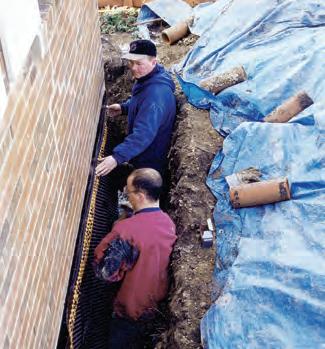
COMPANY SPECIALTY: BASEMENT WATERPROOFING, BASEMENT LOWERING YEARS IN BUSINESS: 40 FREE ESTIMATES: YES REFERENCES AVAILABLE: YES
There are many potential health risks that lurk in a wet basement. The goals of Royal Waterproofing are to stop the water-flow into your home, eliminate mold, mildew and possible allergy triggers and repair and prevent further damage to your home's foundation, resulting in a dry basement. Whether the water seepage is due to deterioration of existing materials, blockage of foundation drains, breakage, clogging or lack of weeping tiles, we tackle the problem where it begins - outside your home. Lifetime guarantee! Since 1985.


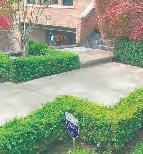
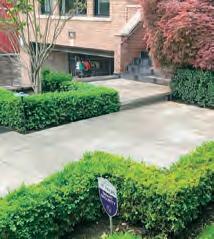




COMPANY
Northern Stone Design Inc., a family run landscaping company, gears itself every season to making landscape dreams a reality for hundreds of GTA customers. The staff at Northern Stone Design Inc. have a combined trade experience of over 50 years, specializing in stone work and softscape for any residential or commercial property. If quality of workmanship and customer satisfaction are your top priorities, look no further than Northern Stone Design Inc. Northern Stone Design Inc. gives at home estimates and consultation for free and looks forward to a great 2025 season with its GTA customers.














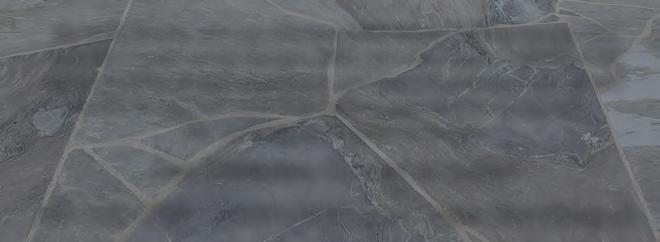
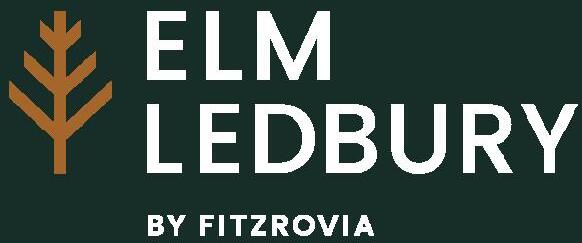





SEBASTIAN CLOVIS
THE HOME NETWORK HOST
Co-Host, Home Network Canada;
Principal, Clovis Contracting
BRAD LAMB THE CONDO KING
President, Brad J. Lamb Realty and Lamb Development Corp.


BARRY COHEN
THE SALES PRO
President, RE/MAX Realtron Barry Cohen Homes Inc.
SALIMA RAWJI THE CITY BUILDER
President and CEO, York University Development Corporation


BRIAN GLUCKSTEIN THE DESIGNER
Principal, Gluckstein Design; Author
ADRIAN ROCCA THE MODERN LANDLORD Founder and CEO, Fitzrovia


MICHAEL KALLES THE BROKER
President, Harvey Kalles Real Estate Brokerage
BENJAMIN TAL THE BANKER
Deputy Chief Economist, CIBC World Markets Inc.


AMANDA LANG THE JOURNALIST Host, Taking Stock, CTV
KORTNEY WILSON THE MASTER OF FLIP Realtor; Co-host, Making It Home
Our 18th annual unscripted & unrehearsed discussion with 10 housing experts on the city’s favourite spring topic.
Special thanks to our incredible sponsors Fitzrovia and The RE/MAX Collection.
SECTION ONE: MARKET UPDATE
POST: As we do each year, we will kick things off with an update on the economy and interest rates from the country's top real estate economist, Benjamin Tal.

BENJAMIN TAL: Let me start by noting that the fact that Trump is Trump does not mean that he's wrong on everything. He's not wrong on the border. Every country needs a secure border, and the border with Mexico is not secure. He's not wrong on defense spending. The U.S. has been subsidizing NATO, including Canada, on defense spending. We have to change it. And he's not wrong on China. China hasn't been playing fair. So now, let's establish what's going on.
To understand Trump is really to try to understand what's in his head. Everything that we need to know about Trump is in the name. His name — T is for tariffs and taxes, R is for regulations. Now, I had a problem with the U, but then U and M — undocumented migrants. And the P is protectionism. It's all in the name. So now, how can we read Trump? And how can we interpret what he's doing?
At the end of the day, I'm not sure that they know exactly why they are using tariffs as a tool, but they can do it. By the way, it's very important to understand that, according to the U.S. Constitution, Congress has the power to impose tariffs, not the president. The president has the power only in cases of national emer-
gency. And now, all of a sudden, everything under the sun is a national emergency. Not enough toilet paper: national emergency.
For the next few months, for sure, it will be chaotic. The market will go down. The stock market will go down. The bond market will react. There will be a lot of volatility. But what's reasonable? We have to remember one thing: Trump appears to be unstoppable. But Trump has his kryptonite. What I mean by that is he has vulnerabilities.
21 million barrels of oil per day. They produce 13 million per day. They buy eight million per day. Most of it is coming from us. If there is a tariff on our energy, their gasoline prices will go up significantly. The consumer will feel it. His base will feel it immediately. So that's another vulnerability.
Another vulnerability is inflation. He was criticizing Biden-Harris about the cost of living. Tariffs are inflationary. If you impose a 25 per cent tariff, inflation will go up significantly. And then you
“I SEE THE BANK OF CANADA CUTTING INTEREST RATES TO ABOUT 2.25 PER CENT, MAYBE TWO PER CENT, HELPING THE HOUSING MARKET THAT WILL BE STRUGGLING OVER THE NEXT FEW WEEKS AND MONTHS DURING THIS PERIOD OF UNCERTAINTY.” — BENJAMIN TAL
POST: What vulnerabilities?
BENJAMIN TAL: Vulnerability number one is the stock market. Trump cannot have a situation in which, under his watch, the stock market is falling. He's always using the stock market as a barometer of success. If he's going to impose all those tariffs, the stock market will go down. It's not a coincidence that a month ago he extended the deadline by one month when the stock market was down by 2.5 per cent. So the stock market is a barometer, and the stock market is a vulnerability: one thing.
Gasoline prices. He cannot have a situation in which, under his watch, gasoline prices go up. Now, the U.S. consumes
don't have time because, if there is a longterm gain, it takes a while to be felt. But the short-term pain is immediate. The inflation story is immediate. And he doesn't have time because the midterm election is in two years from now. And then you have inflation, and the Fed will have to raise interest rates. Trump wants to see lower interest rates, which means that you will have a conflict between Trump and the Fed, which is the last thing the stock market would like to see; back to vulnerability number one.
So what I'm saying here, he appears to be very confident that he can do whatever he wants, but he cannot. This is just a tactic. This is just a negotiation tool. I think that the ultimate goal is to renegotiate the
United States-Mexico-Canada Agreement (USMCA). It's supposed to reopen in 2026. He wants to open it in 2025, and he will do whatever it takes to tell us what he wants.
So the next few months will be chaotic. The market will go crazy. But I believe that the fog will clear six months from now. By the end of the year, we will know where we are. We are going to renegotiate the USMCA. The Bank of Canada will help us. I see the Bank of Canada cutting interest rates to about 2.25 per cent, maybe two per cent, helping the housing market that will be struggling over the next few weeks and months during the period of uncertainty. At the end of the day, the sky is not falling. It's looking very bad now, and I admit it is scary. But remember, he is not a superhero. He has vulnerabilities, and those vulnerabilities will be very, very evident in the near future. That's the worst of the situation. So you can smile.
POST: Amanda, we know buying a home is based on confidence, and you interview a lot of CEOs. So, what's the general feel on confidence in the business world right now? Are they pulling back?

AMANDA LANG: Something I've been thinking about a lot lately in the context of Trump and his impact on us is that we need to keep our circle of worry inside our circle of control. It's not a new saying, but it's been important to me because worrying about things that are existential and well
Worst place you’ve ever lived?
BARRY: My grandparents’ basement when we first moved to Toronto.
SEBASTIAN: I had a large family growing up, my bedroom was off the kitchen. It smelled like curry at all times.
KORTNEY: I lived in a place with no heat when I first moved to Nashville to save a little money.
Worst real estate mistake you’ve made?
BARRY: Didn’t buy enough of it.
SEBASTIAN: Buying a condo in Surrey, B.C. when I lived in Toronto.
KORTNEY: Buying high right before the recession.
BRAD: Buying any development sites between 2020 and 2022.
BRIAN: Not buying buildings I hesitated on.
ADRIAN: Removing all of the bathtubs at my first rental building, The Selby.
AMANDA: I’ve never made a real estate mistake.
Decorating trend that needs to die?
BARRY: White. The white’s gotta go.
SEBASTIAN: Builder beige.
KORTNEY: Shiplap needs to die.
BRAD: No more bronze. No more brass.
BRIAN: Doing an entire apartment floor in shiny, white porcelain tile.
AMANDA: Throw pillows, too many throw pillows!
Next hot neighbourhood?
BARRY: Anywhere there is infill housing.
SEBASTIAN: Wherever I am.
KORTNEY: Can Canada be my neighbourhood?
BRAD: In T.O. every neighbourhood is hot.
BRIAN: I love the Annex.
ADRIAN: King East.
AMANDA: The urban core, so GTA.
beyond our control isn't helpful. You can look at the numbers, the GTA numbers for the Toronto real estate data for February, to see that's not working very well for a lot of Canadians. There is a loss of confidence. There is worry out there. People are on the sidelines. They don't know what to do. In the first Trump administration, we saw businesses sitting on cash and not investing.
But the difference this time is our government is in a different frame of mind. Governments, every provincial government and the federal government, whoever is in charge after the next election, doesn't matter. The frame of mind is different. We're a little more focused. We're working together better. And I would say, what's in their circle of control? Well, a whole bunch of things that have nothing to do with tariffs. The biggest part of our economy is service industries. By the way, our housing shortage is still with us, and it's, you know, yes, deeply affected in some parts by tariffs. A lumber war would not be a good thing. But we can be going full steam ahead on infrastructure, on construction, on new building, on cutting red tape, on cutting regulations, on speeding up development. All of those things are in our control.
POST: With detached home inventory increasing, are sellers being forced to lower prices, or are they holding firm in hopes of a market rebound?
BARRY COHEN: Well, we see it every day. People are dropping prices, but it's generally in the lower price range. They're a little more susceptible to the market conditions and the fears and the chatter about tariffs and elections and everything else. And I can tell you the bad weather hasn't helped us at all. And you see that in February. But when you move into the upper range, you know, the $3 million to $5 million, I think people are taking a wait-and-see approach. And then, when you work your way up the real estate food chain, it's very obvious. The uber-rich are sitting on the side. If the home is compelling, they’re buying; otherwise, they want to have an opportunity to buy it at 90 cents on the dollar
next year. But that hasn't happened, right?
POST: Kortney, over to you. With tariffs and Trump heavy on everyone’s mind, it’s great to have you on this panel. What are you seeing in the detached market right now?

KORTNEY WILSON: Well, first of all, you all are so smart, and I just feel so grateful to be on this panel with all of you. So thank you. I live in Nashville, Tennessee. So a lot of the expertise that I have is contained to that market, and we are somewhat isolated being sort of the NashVegas of the south. But I actually agree. I think it's relative. It's affecting my lower listings more than anything. However, home prices are up by a long shot in this first quarter already, where we are. And I think it's because people have been sitting. They locked in really low, historically low. What I'm seeing currently is that people are ready to take the plunge,
“WE NEED TO KEEP OUR CIRCLE OF WORRY INSIDE OUR CIRCLE OF CONTROL. THAT’S NOT TARIFFS; IT’S CONSTRUCTION, CUTTING RED TAPE, SPEEDING UP DEVELOPMENT.”
—AMANDA LANG
even if that means breaking even. I'm not seeing people in Nashville take a huge hit because, again, they've locked in at historically low prices or interest rates of three per cent. And now, we're at six and a half. What I am seeing, however, is I've had three people in the last week in Nashville call me about selling everything in Nashville and moving their real estate ventures to another country, one being Canada. If I had a nickel for every time in the last month somebody has asked me about immigration or immigration into Canada! I'm a dual citizen, born in Canada. So that's been interesting for me there.
BRIAN GLUCKSTEIN: When Barry was talking about the buyers — you know, we deal with an affluent buyer base — and they are feeling there are some deals out there, which are not significant, but the big thing we're seeing right now is the clients are asking, what is the cost going to be to renovate these houses
based on the tariffs? So that's giving them a pause. They're not not doing it, but they're now asking us, how much will the appliances cost? How much will the plumbing fixtures cost? How much will the materials cost that are made in the United States? How significant is that going to be in a difference to the renovation that was done a year ago? So they're not stopping the process, but they're slowing the process down because of this caution and uncertainty.
We're trying to tell them there are certain products that we'll buy not from the United States. So we'll buy appliances from Germany. We'll buy stone and tiles from Spain and Italy. We're looking at plumbing fixtures from Europe. We're asking our vendors, does the product now come through the United States? A lot of it came to the United States, to the distribution centres, and then came up to Canada. We don't want to do that anymore. So we're telling our vendors, we want a direct ship from Europe. And we're working on that now, and the vendors are coming to us with that information. And it's the best way to do it anyway because we're paying duty into the United States and then duty into Canada. So in the long run, I think this is going to be a long-term effect in the way we renovate these houses and buy the product.
POST: Barry, can we follow up a bit on the luxury market? You were saying the luxury market here in Toronto has remained basically the most stable or the most resilient. Is that just because those buyers have money that they can count on?

BARRY COHEN: It is resilient in the higher end because they can afford to wait, right? — if there's an opportunity. But when we actually look at last year, and it was a very quiet year, the year started off with one sale over $7.5 million for the first two months compared to this year where there's already been six. And then we went through all of last year with virtually no uber high-end sales, right? And when you got to about the last quarter of the year, I think everybody got comfortable with the new land transfer tax. That was the theme last year, the land transfer tax. So, by the last quarter, we were selling real estate. As a matter of fact, we were laughing on the first week of January. I wrote a memo to my team saying, “Hey, it's
2025, everybody's gonna forget about 2024, rates are going down, and Trudeau just announced his eventual resignation. Get on the street and start working.” And then Trump appeared! So everything has changed in the last five weeks.
POST: I see Amanda wants to jump in.
AMANDA LANG: I just wanted to say, because we can always tie the macro to the micro, and one of the things that has been happening for decades, but will be writ large with Donald Trump in America, is the bifurcation of our society. And the people with money will have more money. You know, we've seen this described over time, but the capital is now circulating among the people who have assets, and it's not trickling down to the people who have incomes. And so, the real estate market will see a similar bifurcation between those two, and it'll become more pronounced, I think, as we go forward, not less. Unless we do something, human beings could change this with policies, but if we don't change the policies, we're going to keep living in this world.

MICHAEL KALLES: We did a quick study. Let's look at the last few major issues in the economy. When the dot-com bubble burst, the S&P 500 went down 50 per cent, the HPI, the housing price index, in Toronto went up 15 per cent. The financial crisis, the last financial meltdown — S&P down 58 per cent, HPI up 18 per cent. COVID 19 — S&P down 20 per cent, housing market up initially five per cent, and then eventually 42 per cent. So I think a lot of people are going to be looking to something that's very stable, and I for one am very bullish on the Toronto real estate market. I think there's certain segments, like the condominium market, that are going to take some years to get through the current inventory. I think we'll be thinking about things in a different way in 2028.
POST: Let's go to Sebastian. How is the hesitancy around buying right now impacting the home improvement market?

SEBASTIAN CLOVIS: I think it's impacting it in several different ways. Typically, major renovations happen in the first three years of somebody purchasing a home. They buy a home, and they want to make it
their dream home. And so they'll get a mortgage that can accommodate their renovation budget. As sales start to go down, there's less of these people that are in that one-to-three-year kind of period, and therefore the home improvement industry starts to go down because there’s not as many people buying homes. So that's the first thing.
The second thing is I think that parties who are involved in flipping properties — which requires that they sell the home immediately after they finish the renovation project — if they can't guarantee that they're going to be able to sell the home, then they're not going to take on the renovation project. And so I think there's less flipping going on. The business model doesn't work in the current industry. And so again, the home renovation industry starts to take a hit from that.
And then I think many homeowners are kind of asking themselves the question fearfully for the first time, is my house still worth what it was when I bought it? I think, for the first time ever, people are actually starting to question that, which means that when they go up for their mortgage renewal, there's a chance that their house is not worth the same thing that it was worth when they purchased it. That means that they're not going to be able to borrow against the perceived value of the future sale of that house in order to renovate.
We may have been having a conversation in the past about the haves and the have-nots. It seems like this might be the beginning of the era. The fact that there is still resilience in the luxury real estate industry and not on common ground says that we might be moving into an era where it's a conversation of the have-nots and have-yachts. And I would say that either way, you better have a life jacket.
There haven't been any new condos breaking ground over the last year and a half. So we have a situation where, according to Amanda, and I believe her, we have a housing shortage. I don't think it feels like that to people right now. I think it feels like there's a housing surplus because interest rates went very, very high. It scared people, made things difficult, and people stopped buying. They just turtled and stopped buying. Even if they need a house or they're forming a family, they're just not buying homes. They're not buying condos, they're not buying houses, and they're certainly not buying new condos.
So we have a real crisis forming here because, if you count the cranes — I don't know if people do that for a hobby, I do — there were 170 cranes two and a half years ago in Toronto, more than the 11 largest cities in the United States. That's how many homes we were building. It was pretty amazing. If you count now, there's less than 50. In another six months, there'll be less than 35, and in about a year and a half, there will be close to zero. I think Fitzrovia will have all the cranes. They'll have maybe 10 cranes and that'll be it.
So we're in a very, very bad situation. It's worse than I think the early ’90s when we had a similar situation because we have stopped on a dime building new housing in Toronto. And there is a shortage of several tens and tens of thousands, probably 150,000 to 200,000, multi units. There's probably a shortage of that or higher in Toronto. We're now contributing zero to that.
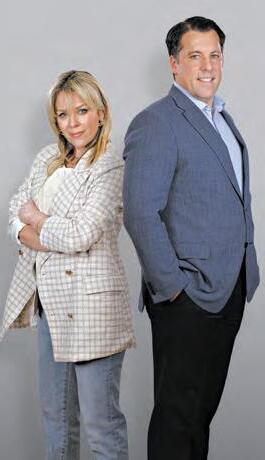
As someone with a referral network as a realtor in Nashville, I think we're going to see a large population of people in the red states, especially LGBTQ-friendly people going to friendly states, or friendly countries, rather. And I think Canada is going to be one of them.

two or three years.
So what does that mean? It means we're going to have mass unemployment in construction. It means those people who came to this country for jobs are going away because they're unemployed. They're not going to come back when we need them. So our construction industry is shrinking. Now, when we do get a market back, it'll come back raging where there's not enough product and there'll be competition for product. You can't see it now, but I promise you it'll come. Maybe it's two years, maybe it's three years, maybe it's five years. But when that happens, we don't have enough trades to build these homes. We don't have enough expert people to build the homes. So what happens is that those prices go higher, housing becomes more scarce, less gets built, housing prices get more expensive.
I think rents are going to be flat for 12 to 18 months. I think we will get into nearly double-digit rent increases in 2027, 2028, 2029. So I think, if you are brave in this market, you will be rewarded if you actually put a shovel in the ground. I also see a lot of foreign capital coming to the Canadian market to play the currency depreciation right now. We're getting a lot of interest from the Middle East and Asia, and you'll see some bigger headlines coming into the market.

We're still in a housing crisis. We still need the millions of houses that we needed last year at this time, when we had this panel, that haven’t been addressed yet. In 1945, soldiers were coming home from the Second World War, and there weren’t enough houses. So the federal government decided to rubberstamp three or four designs that you could just build. They were being built in 36 hours, 700 to 1,100 square feet with a backyard. But my point is that we need a more diverse housing stock that can accommodate more people. We've built millions of houses before. The federal government has helped with it, and we can do it again. I’m telling you as a builder, we can get the houses built.
I think the market is going to continue to be stagnant, and there's so much uncertainty. But one of the things I wanted to mention, not for 2025, but we're going to see a tsunami of money coming in through inheritance. So if we think prices are high now, wait until we have a generation that inherits all this money sitting in GICs and their parents' houses, then we're going to really see prices go up. So it's going to be interesting to see when that happens. Benjamin can say when that will happen, but it's going to be soon.
KORTNEY WILSON: I'm just curious: are interest rates the only thing standing in the way of buyers who are sitting right now?
BRAD LAMB No, so this is what’s happened with real estate prices. We need $1,600 a foot to build the new highrise condo in Toronto. We can sell them right now for $1,100 a foot. Our cost is about $1,320 a foot. So we can't build anything. Everyone is sitting on their land, everyone's paying their debt, everyone's trying to look to the future. We need real estate prices to rise 25 per cent. So that $1,100per-square-foot condo was $1,350 or $1,400, now it's down to $1,100, and it needs to go back up to $1,400 and then pop up to $1,600 a foot for me or anyone else like me to build new houses.
Now, the chance of that happening in a couple of years is not possible, right? So the solution here is we're going to need to have the HST removed on housing entirely, like gone, because the HST represents, for me, $200 a square foot of cost. And we absolutely must remove all levies on any construction in the city of Toronto, all levies. So right now I pay $75,000 a door [a unit], pay about $200 a foot. So if you take that $400 a foot and you take it off my cost, I can now deliver a home at $1,200 a foot and we can build housing again.
And back in 1991, I don't know if anyone remembers 1991 to 1996, in that period, no one was building houses. From 1990 to 2001, the city of Toronto eliminated all levies on housing, and the market started again. That has to happen. That is the only thing that's gonna save this city from a spiral, because we need to build housing. We need to build housing to fulfill the need for housing, and we can't wait three or four years to get back doing it.
BENJAMIN TAL: If I may, can I put something in perspective here? I think it's extremely important to understand because this is a very crucial time. So we started with Trump, and the Trump situation will resolve itself one way or another. There will be tariffs, there will be something. Next year when we meet, we won't be discussing Trump as much as we are doing it now. We'll be discussing affordability.
I totally agree, we are in a situation in which we are building nothing in the condo market. Absolutely zip, nothing. The demand is going to grow. In fact,
population growth is not zero, it's not negative, it's actually positive. It's rising. It's rising faster than perceived, and we have more people than we think in this country because we are undercounting non-permanent residents.
Another thing which is extremely important when it comes to housing — every other OECD country is getting older. Canada is getting younger. Last year we got 1.2 million people into this country, over the course of breakfast. And it's a short-term pain, because you have to find housing and all this business, but it's a long-term gain. If you look at the age structure of this Canadian population, it changed dramatically over four years. We are getting younger. The last time it happened was 1957, the baby boom. Back then they needed diapers. Here they need help, they need housing. So in the short term, it's very painful for the economy and the housing market. But in the long term, we are getting younger. We have this huge dividend that
“THERE WILL BE NO NEW CONDOS BREAKING GROUND OVER THE NEXT TWO OR THREE YEARS. SO WE HAVE A REAL CRISIS FORMING HERE; WE HAVE A HOUSING SHORTAGE.” —BRAD LAMB
no other country has, and that will be positive for demand for housing. We need the supply, totally there with you. We need to cut all those taxes and levies because it's insane.

BRIAN GLUCKSTEIN: Well, one of the things we have to do is, from a development standpoint, the city has been very spoiled, and developers have been spoiled because buildings that we would design would sell in a weekend. People would buy 20 units at a time from overseas. And we have to reimagine: who are we building for? So we have been building so many buildings for investors, not owners and not families. And the problem is we have apartments that are 300 square feet, 475square-foot two-bedrooms, where a bedroom is eight feet by eight feet. You can't fit a twin bed in, and you have to climb out to open the closet. So this is not what families want to have. We have to reimagine. We cannot build buildings for
investors. We have to build buildings for families and couples that wanna grow within there.
If you're going to buy an apartment and it's gonna take you 30 years to pay for it, you want to grow within that space, and you're not growing in a 475-squarefoot two-bedroom. So we have to reimagine two years down the road because we're not going to be building anything. We have to reimagine spaces and figure out how we're going to build larger apartments where people can have a queen-sized bed in their bedroom.
SEBASTIAN CLOVIS: I love that. I love that. Round of applause. Because I think that was right on. And I 100 per cent agree. I think that when sometimes we talk about the missing middle, we're talking about the segment of housing that we need for real families to live in. I think what we need to consider is that the middle is not just one type of house. Like a three-storey, three-bedroom detached home is much different than a small bungalow. And so there needs to be a bridge. There needs to be different types of housing for different parts of your life.
We need a bridge that takes people from living in their parents' basement to renting with something that makes sense to getting into a small home and then eventually being able to afford a larger family home.
BRAD LAMB: So maybe I'm a realist, I don't know. I just said my cost of building a highrise condo, and this is like a 50storey building. So it's not like we're wasting land, right? My cost for 1,000 square feet is $1.3 million. My cost for 700 square feet is $1.1 million. My cost for 478 square feet is $700,000. So I don't know. Can the average consumer afford a $700,000 condo? I don't think so. So we can all dream and talk about what would be lovely, but that's not gonna solve the problem.
BENJAMIN TAL: What are the development charges now?
BRAD LAMB: Development charges are generally around $70,000 a door [a unit].
BENJAMIN TAL: So let me ask you a question. $70,000 times zero is zero. And zero is what we are building. So when the government or when the municipalities are cutting development charges, they are not losing any money because they are not making any money because they are
building zip. So why don't you cut it? It doesn't make any sense.

SALIMA RAWJI: We're talking about supply shortage. It's real. Why do we have it? Because we have immigration. Why do we have immigration? Because we have a GDP problem. This is not going to go away in the short term. So we are going to continue to need people to come to the city. And if people need to continue to come to the city, they have to say, “I have economic opportunity,” hence the opening part of the conversation. And they need to say, “I have livability.” And what does livability mean? That's what you're talking about. But there are a lot of other ways to get to livability other than living in a unit with enough square footage for a wife and kids. Being able to access amenities in your building is important, a.k.a. what makes your unit more livable. We should hear from Adrian because he is doing a phenomenal job at livability. And I'm sure he will want to talk about it.
I mean, I don't disagree with anything Brad has said. We are not building. Like he is talking about truth. I have spent the last 20 years of my life working in institutions that have land trying to put product into the market. There are zero transactions going on. What is going on is people not being able to hold onto their land and trying to get rid of it, but we don't see that translating. And so we do have to fix it. It does have to come from levers outside of the individual, that is true. But I do think that there are other things that we can think about in the conversation in the continuum of the conversation. We haven't touched on seniors.
few, because of our vertical integration. We develop, construct asset property, manage entirely in-house. We actually go more downstream than that. We have our own school that plugs into our young family buildings. We do our own kind of food and beverage line. We have a bunch of different levers where we could move fees around and profit around to make sense of going vertical. And we're really focused on tactical execution, our ability to move quickly through design, development, construction and actually start cash flowing. That gives us a big advantage in the market. Most people don't have that advantage, right? And so when you look at rents declining, 8.5 per cent, everyone's like, “Why are rents declining eight and a half per cent?” Because we have 25,000 units completing this year. And we have a lot of downward pressure on rentals. We have a lot of downward pressure on lease velocity because of that. It's an absolute dog fight with concessions and trying to create separation, not only with our competitors and purpose-built rental, but also the condo market. And it's pretty binary. An investor that bought is in survival mode right now to drop their rents to at least cover a portion of their mortgage, right? So that creates a huge issue in our market.
And so as a mid- to long-term view, I'm incredibly bullish on building rental. And we're going to continue to do that when we want to be the pre-eminent national players. Doing that today is incredibly difficult, right? You need institutional capital. It's a big balance sheet game. It's not a private balance sheet game, unless you could get ACLP [Apartment Construction Loan Program] from the CMHC [Canadian Mortgage and Housing Corporation], or kind of do smaller buildings. There's a lot of financial recourse or guarantees that you have to underwrite as a developer or as a landlord.
locity, really strong rental tones in that segment of the market. But it's not just real estate. It's not just bricks and mortars. It's not just the size and composition of those suites. It's how do you actually program? How do you bring that to life? If you're going to go after young families, where are they going to go to school? Schools are at their capacity. I'd argue the quality of the education has deteriorated over the years. I didn't want to deal with the city. I didn't want to deal with the province to get a school and go through all that red tape. So we just created our own school. It's called the Bloomsbury Academy. We do it at subsidized tuition just for our residents.
I lived in London in the U.K. for seven years, and so we fundamentally wanted to create different product. I love masonry, I love brick. Our facades are really uniquely different. I remember the first building I did was when I was at Tricon, the Selby, which is a 50-storey rental tower. And people would say, there's no way the U.S. operating model and rental model is going to work up here. Canadians are fundamentally different. I totally disagree. As it relates to tariffs, I'm pro-Canada, but as it relates to hospitality, Canadians are no different than anyone else that wants to go to a really nice hotel and get looked after, right? — and wants to walk in their front door and see an animated lobby and really great customer service and great hospitality with great programming. If you're a new member to Canada, you're going to get a community that's going to invest in you and invest in that experience, and that is what we need more of. And we're just not getting that at all. What I get all the time is “You're only building luxury.” We're across the spectrum. By the way, we are going to get into affordable social housing. I'm really passionate about that.

The only prediction I have is that we're headed into a year of wild uncertainty, and it might feel quite unpleasant. But I think by the end of the year, toward into next year, we'll have clarity on a lot of things, including possibly a new trade agreement with the U.S. Things will feel calmer. This is a time when governments can do big things, and ours seem galvanized at every level. I hope we do big things this year. That's more of a hope than a prediction, but it's what I'm sitting in amid all of the bad feelings of not knowing what's going to happen next.
POST: Why are rental rates declining? How low will they go? And any other thoughts you want to throw in there, Adrian?

ADRIAN ROCCA: Who in this room actually thinks, I hear this all the time, “Oh, you must be so happy you're not in the condo market. Rental's where it's at.” Who actually thinks rental's where it's at today? Put up your hand.
So this is the only way we can make rental work today: we're one of the very
I definitely agree with Brad, right? Like what was sold off plan, you know, in terms of a very small kind of one-bed, 450 square feet, 650 square feet two-beds, that actually sold really well. The rents don't translate in the same kind of respect. We've actually made a really bold call going after young families and downsizers, right? It's a pretty lonely place right now. Most of our buildings are larger, more livable suites. What does that mean? We're doing 850-, 900-square-foot two-beds. We're doing 1,100, 1,200-square-foot three-beds.
We're actually seeing good leasing ve-
Now, are you creating a big balance sheet on the back of that? No, but you're living a comfortable life. It's sustainable. You could run a P&L [profit and loss statement] on the back of that. You could actually live a really sustainable life. So I think there are actually more legs in that segment of the market than we're giving ourselves credit for. We do get a lot of pushback from some institutional investors around the longevity around the rents that we are underwriting. But I actually say, in the next five years, 75 per cent of the highrise product is actually gonna be PBR, purpose-built rental versus condos. And I think that's a good thing.
Uncertainty aside, I think interest rate policy will eventually get traction, and buyers will get off the sidelines and buy. The market will start to improve. There's been some kind of sideline stuff happening, but it'll start to improve. The overhang in the rental market and the condo resale market will probably largely clear up this year. We'll see some price increases probably toward the end of the year, midpoint to the end of the year. Ultimately, the market's going to get better, and we’ll see that by this time next year. It still won't be a place where we can sell new housing out of concrete, but the stick stuff will happen, and we'll see a resurgence of that.

I think that the average price will hold level this year. I don't think we're going to see any growth. I think that the condo market, new condos, is going to continue to suffer. But resale condos are holding their own. They're up or down one or two per cent. But where I do see a shift is in luxury condos.We are selling high-end condos, $3 million and up, and that's going well. but we're also selling $6 million, $7 million and $8 million condos, and we're finding that people are moving from detached into these large condos for safety or downsizing. So I think that that trend will continue.
Well, I think that the economy will slow down over the next few quarters. There's no question about it. The unemployment rate, unfortunately, will rise. Things will clear at the second half of the year toward the end of the year. Interest rates will be lower than they are now. And I think that what would be a big surprise is how quickly demand will be rising. I think that population growth will be faster than expected, and that's something that will add to demand. So the inventories in the condo market will be swollen faster than perceived.
BARRY COHEN: Do you foresee a glut of rent? Are we short inventory right now on purpose-built rent?
ADRIAN ROCCA: Today we are not, but if you actually forecast the drop in new starts — if you look at the last 10 years, we've been about 16,000 units — I'm talking about condo and purpose-built rental. If you look at last year, we were down to 12 [thousand units]. This year we're gonna be down — these are new starts — down to five and a half to six. So we are totally undersupplied. If we talk about a housing crisis, the longer this goes, the government's gotta wake up. They have done a good job engaging the private sector. What they've done a poor job is sticking their neck out and forgetting about politics and actually making good decisions. So I think that needs to change. Thirty per cent of our total development costs is municipal levies, government levies, development charges. We need a full waiver.
The government continues to reach out. Ben and I have been in a number of meetings with them, but they have not done anything, especially municipally with the mayor's office. We actually need more help. Zero of zero is zero, right? The fact that we've been sitting on our knees right now, waiting and pleading with the government to actually step up and help is a disgrace. We absolutely need help yesterday. And the longer this goes by, this is gonna turn a crisis to a catastrophe.
POST: Michael, do you want to weigh in before we wrap up rentals?
MICHAEL KALLES: I'll just give you the perspective from the brokerage side. Listings are up 46 per cent on rentals. There's just a major glut, what we're seeing, and our product is different. It's usually investor condo units, owners who thought they would make it big on capital appreciation. Now they're saying, look, let's see if we can just get some type of contribution to our mortgage payments. But I think the big thing is that, right now, I'm hearing Brian's words from last year saying that people are making a decision to live in a rental, and listening to Adrian — these are lifestyle condominiums. I've seen basketball courts and facilities that are second to none. And you can't compare that to a person who bought an investor condo and is trying to push it out the door. But we are seeing incentives from landlords, free months, reduction in rents coming month
after month after month. So it's certainly changed in the last six to 12 months.
POST: We're going to jump into our audience's questions. The first one is for Benjamin, what is the probability of the Bank of Canada raising rates to support the Canadian dollar?

BENJAMIN TAL: Twenty-two percent. No, they will not do that. The opposite is going to be the case. I think that the Bank of Canada will be cutting interest rates. They have to show that they are participating in the effort to fight Trump to an extent. The government is going to do something as well. So the government, plus the Bank of Canada, will try to help. I will not be surprised if, by June, July of this year, we'll see interest rates much lower than they are now. We see the Bank of Canada cutting to about two per cent. [Editor’s note: After the panel, the Bank of Canada has since cut rates again from three per cent to 2.75 per cent.]
“AN INVESTOR IS IN SURVIVAL MODE RIGHT NOW, DROPPING THEIR RENTS TO AT LEAST COVER A PORTION OF THEIR MORTGAGE. THAT CREATES A HUGE ISSUE IN OUR MARKET.”
—ADRIAN ROCCA
POST: Our second question, anyone can jump in, how can we get development companies to build larger units instead of megaprojects with all tiny one-bedroom and studio units for investors?
BRAD LAMB: So there's been a lot of talk about small condos. So here's the issue. We have to sell 70 per cent or 75 per cent of the building before a bank will lend us the money to build it. That's how the model works. No one is going to put $400 million into a building of their own money and just build a building. So you have to borrow the money. So in order to borrow the money, we have to have the sales.
So we had to figure out a way of selling buildings quickly so that we could actually build them instead of giving their money back and getting in trouble with the newspapers and Tarion [the Province of On-
tario’s new home warranty program]. So the model is, it always was investors, it's now more so catered to investors, and there's been a lot of slagging on condominium investors. I disagree with all of it. Most condominium buildings are very nice. The facilities are very nice. The ones I build are beautiful. We just finished a building called the Bread Company nearby . We're renting 480-square-foot apartments, so investors are listing for $2,200, $2,300. There's nothing wrong with that. That's not any lower than it was a year ago. It's about the same. I think if you deliver something nice, people will come to it.

SALIMA RAWJI: Let's just think about the history of time. We had a bunch of rental construction happen in the ’70s. There was government support that made that happen. The government support went away. We had growth in our market. So we had condos. We had net inflow, so we had demand for housing, and so we see run up in prices. So people say, "Hey, this is a good way for me to make money." Nothing wrong with that. Our industry responds. What does our industry do? We design for the investor. And we all knew it was happening, and we all did it. And the structures of the industry are designed around that model. If the question is, "How do we not do that?" then we need to focus on the end user as the buyer. And then, what has to happen structurally in the system to change so that the end user is the one that actually drives the decision making through that process.
AMANDA LANG: Which, not to be the skunk at the garden party, but people talk about our housing market as though it's a market that's not functioning. And I would say it's a market that is functioning exactly as we've designed it…
SALIMA RAWJI: Exactly.
AMANDA LANG: …Which is we've financialized it. We turned it into an investment product, and therefore, scarcity is rewarded. And that's why we don't build, and that's why we price people out of building, because 60 per cent of us own houses. And no politician is going to stand up and say, "The solution to our housing problem is that the value of all of your houses is going down 40 per cent." That is the solution, by the way. We need to build enough houses for the overvaluation to come out, but more importantly, it changes the customer.
It changes the product. And if we don't do that, we're going to have the same problem.

BRAD LAMB: We cannot get end users to make a decision, a timely decision, in buying an apartment. We can't wait two years. We can't open a sales pavilion and wait to have 200 sales happen over two years. We can't do it, or we can't build it, because the costs go up too much. The city even changes tariffs. In a period of two years, they could double, and in fact, they did double the tariffs for the lot levies from $35,000 to $75,000. So we get stuck underwater. There's no model. And by the way, Miami, L.A., New York, same thing. They all sell their condos to investors.

AMANDA LANG: Brad, I have no problem with you building for investors and investors participating in this market, if that's what we decide to do. Where you lose my interest is when tax dollars are then going to support that process. You want an HST break. You want developer fees cut. Which, by the way, they don't go to fund Cadillacs. They go to us. They go to the city. So we have to square the circle here a little bit on what our efforts are about.
BRAD LAMB: Well, you're going to give a tax rebate to Fitzrovia, who are building apartments. So, who cares if one guy owns 300 units or 300 guys own one unit? That's a rich guy, and you're saying that this rich guy can have all these great incentives. Why can't the one person that's buying an investment condo get an incentive to build a home for someone who can't afford to buy a home? What's wrong with that?
AMANDA LANG: Well, don't be disingenuous. Partly, that's because of the type of housing that he's building. So he's getting taxpayer government support, policy support for the type of … again, it goes back to building condos that are livable for people that need the homes, the market that we're trying to serve.
BRAD LAMB: His [Fitzrovia’s] apartments aren't as livable as you think. Nine hundred square feet for a two-bedroom? Come on. When I started selling real estate, a two-
bedroom was 1,500 square feet. That's livable. Nine hundred square feet is barely livable. He's doing what he has to do. He needs a rent per square foot to make it work. He knows exactly what he's doing, and that's why he's doing it.
AMANDA LANG: He's still working within the system we have.
BRAD LAMB: You live in a dream world.
AMANDA LANG: He's working in a financialized system.
BRAD LAMB: I'm sorry. You need to be a realist and not live in a dream world.
AMANDA LANG: No, no. You're saying you want the system as you operate it to stay the same. I'm saying, if we want to make change, you have to actually change things. That's all I'm saying.
POST: OK, that's the perfect segue into the next question. When we're talking about the public, the average buyer, when there are weaknesses in the market, how do people right now take advantage of that?

BARRY COHEN: I don't really think there's a weakness. Again, there isn’t a mentality to buy a house right now. But we're talking about a one per cent, two per cent change in price. In the past five years, if you go back out to 2022, we're up about seven per cent. The big jump was 2019 to 2020, right? and then 2022. So, right now, we're seeing, OK, real estate went down two per cent. Sales are down 25 per cent. It doesn't change the average price. But forget about waiting for a weakness because the demand will be too strong. As rates go down, people will find real estate more affordable. More will come in. There's wealth transference. There's still immigration. I don’t see that changing in the near future. Buyers have to look outside Toronto. If you can’t buy a detached home — it’s $1.7 million in Toronto right now — you’ll have to look to other areas.
KORTNEY WILSON: One of my jobs is convincing buyers right now that they are, in fact, paying 100 per cent interest when they're renting a house and that this is the time for them to buy, even if it's outside of the district they want to be in. And I'm having great success. Of course, it's slightly more affordable. But when everything flips on its side, we will see, again, supply-todemand issues, and they won't be able to afford anything for the next 10 years.
MICHAEL KALLES: Just a quick point. In today's market, there's so much money on the sidelines. It's not like the financial meltdown that billions were melted away. The money is there. It just takes confidence, right? And all of the things that we're talking about, federal election and tariffs, that's the enemy of real estate. But I can tell you there are opportunities, but you have to be a pioneer. You have to step off the sidelines to pick them up. I say this every year, but I'll say it again. I think I've said it for 18 years straight, but no matter when you bought, if you held a home for seven years anytime in the last 60, you've made money. So don't treat it like an asset. It's your home. It's utility. It's made-in-Canada memories. It's where you raise your family. So I think that we have to stop thinking about everything as asset. The best time to purchase a home is when you can afford it. That's the time to step off the sidelines.
BENJAMIN TAL: Just one thing about the money on the sideline, very important, is that investing was easy over the past few years. Everybody went to GIC. Remember six per cent, seven per cent GIC? Forget about investment, forget about stocks. Now, GIC rates are going down, with interest rates going down. I estimate that there are $370 billion of excess savings sitting in GICs looking for the exit. And this exit is real estate. This exit is dividend-paying stocks. So there is a lot of money in the system to finance a lot of purchasing. There is purchasing power, and this money is looking somewhere. And if real estate would be a good opportunity, people will go there because the money is there. There's no question about it.

I focus on students right now, and so I think we are going to see student housing continue to pick up interest as an asset class in 2025. I don't know about 2026, but definitely, we're going to get deals done in 2025.
Well, I'll quote someone from my office. They had a funny line. They said, "People in Toronto don't like to buy real estate unless there's a lineup." I don't know why that is. Step off the sidelines! So my prediction, looking a little further into the future, as I said at the beginning, I'm very bullish on the market, and I think there's going to be some instability. I think condos are going to be back by 2028, and I think we're going to be in a better, probably stationary, year. I think it'll be probably around where we were in 2023 and 2024.

Dr. Lewandowski is a graduate of New York University (NYU) College of Dentistry. He has worked as an instructor at the NYU Faculty of Dentistry, University of Toronto Faculty of Dentistry as well as in a hospital based dental clinic. Dr. Mostyn obtained her dental degree from The Faculty of Dentistry at James Cook University, Australia. Dr. Haley Frydrych received her dental degree from U of T. BIO
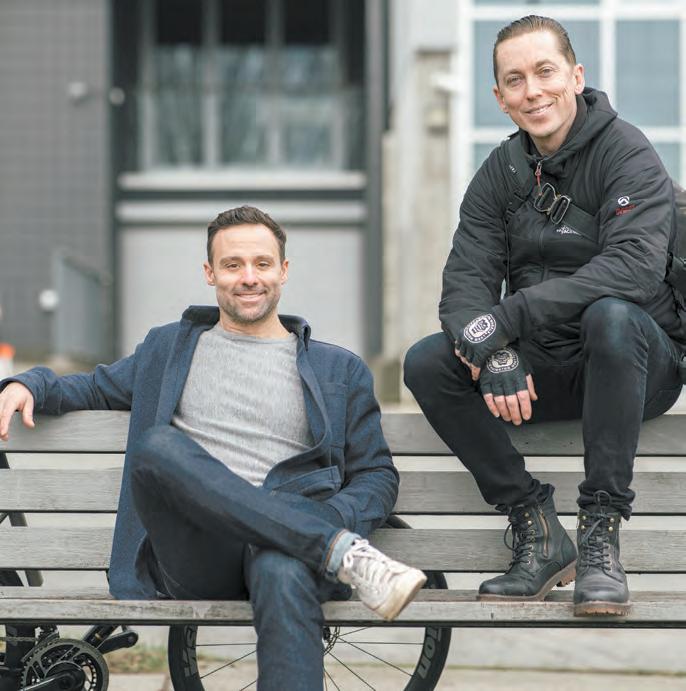
• Do you wear dentures? Many people over the age of 65 use some form of removable denture. While the majority of dentures fit well, some always move, lift and cause discomfort. This may lead to difficulty chewing and lack of confidence in social interactions. There is a strong link between overall good health and proper oral care.
• Dental implants can help. Implants can restore comfort and confidence, helping people love their dentures again. A dental implant has two parts: a metal root that is secured to the jaw bone and an abutment which securely anchors your denture in place, preventing movement. Versatile implants can replace a single tooth or a bridge, eliminate the need for a removable partial denture or even secure complete full-mouth dentures. Implants have a proven track record for long-term success. When using implants to replace a single tooth, neighbouring teeth do not need to be used as anchors, making it a conservative choice in many cases. Dental implants do not require any special care. Age is not a factor in the success of dental implants. Most people
Dr. Edwin Lewandowski and Associates 1200 Centre St., Suite 101 Thornhill, ON
in good health are excellent candidates.
• Do you have broken or missing teeth? One Visit Porcelain Crowns may be right for you. A full or partial crown is used to replace or strengthen a broken tooth. When a tooth is filled multiple times throughout a patient's life, the critical tooth structure may be lost. Many of these teeth break and require restoring. Options usually include very large fillings or crowns. Fillings fit inside the tooth and require original tooth structure to hold it all together. If part or all of the original tooth has been lost, then a full coverage crown may be a better option. With digital technology, we can make a direct 3D image of the broken tooth from the patient, design the new tooth (crown) on the computer chairside and have the new tooth made in the office. These crowns are beautiful, strong and functional and permanent. Often done in one visit. Amazing technology!

We love cycling! We do it for exercise, we commute to work, we pick up the kiddos at school and grab groceries on our bikes. Riding a bike is an incredible way to explore Toronto, while doing your part to fight climate change. That said, in our busy city it is not without some risk.
Collisions with motorists happen more regularly than we would like. In our experience this is often due to distracted and dangerous driving, as well as impatience of those behind the wheel. The results can be quite serious for people on bikes. We see concussions, broken bones, and even psychological trauma regularly.
Our hope is that it never happens to you, but it is always best to be prepared. Who knows, maybe you’ll be able to help someone as a witness to a collision. In either case, here are critical post-collision steps to take:
1) Get off the road and to safety if your injuries permit.
2) Contact authorities at the scene by dialing 911 or asking a bystander to do so.
3) Take pictures of the driver’s license plate, property damage, bike lane blockages, etc.
4) Seek medical attention even if you think you’re just a little banged up.
If you’ve been struck by a motor vehicle and injured, no matter who’s at fault you have access to Accident Benefits through auto insurance for lost wages, physiotherapy and associated medical costs. You may even be able to seek additional compensation through a lawsuit to provide for longer term recovery needs.
Of course, always contact a lawyer who can advise you of your rights. Be sure it is one who specializes in cycling law!
Ride bikes, have fun, be prepared and be safe. See you out there.



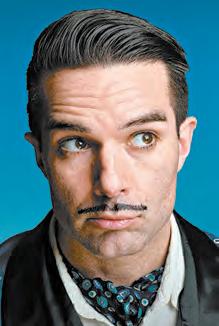



The hottest shows and events in Toronto this month include a night of standup with Troy Hawke, foot-stomping country with Kelsea Ballerini, documentary films at Hot Docs and more. By Ron Johnson
KELSEA BALLERINI
Kelsea Ballerini brings her show to Scotiabank Arena on April 13 — her only Canadian stop on tour. The rescheduled date ensures fans won’t miss out on seeing the country star following the release of her latest album, Patterns. Scotiabankarena.com
The Royal Occasion fundraising concert is scheduled for April 24, featuring performances by Paul Shaffer. Yes, that Paul Shaffer, along with Rufus Wainwright, Amanda Marshall and others at Koerner Hall. Rcmusic.com
FRANZ FERDINAND
Scottish indie rock band Franz Ferdinand will bring its energetic, danceable sound to Toronto’s History on April 15. Known for hits like “Take Me Out” and “Do You Want To,” the band continues to captivate audiences. Historytoronto.com
A STRANGE LOOP
The Pulitzer Prize–winning musical A Strange Loop takes the stage at Soulpepper Theatre from April 22 to June 1. This thought-provoking production follows Usher, a young playwright navigating his identity, ambitions and inner demons. Soulpepper.ca
Lucy Dacus brings her signature storytelling and songwriting to Toronto’s Massey Hall on April 25–26, as part of her Forever Is a Feeling Tour. Fresh off a groundbreaking year with boygenius, she’s set to captivate audiences with new music. Masseyhall.com
Britta Johnson’s Dora Award–winning musical Life After returns to the CAA Ed Mirvish Theatre stage, opening on April 16 and running until May 10, with an exceptional cast that includes Jake Epstein, and Chilla Kennedy. Mirvish.com
TROY HAWKE
Troy Hawke, the mustachioed mastermind behind the Greeter’s Guild, brings his razor-sharp wit and 1930s charm to the Royal on April 11. Expect a night of impeccable comedy, wordplay and eccentric observations.
Theroyal.to
American super fun rock band the Linda Lindas is an all-female pop-punk extravaganza formed in 2018 and taking the world by storm. The band checks into the Opera House on April 26 for a sold-out show.
Theoperahousetoronto.com
The 32nd annual Hot Docs Festival is scheduled to take place in Toronto from April 24 to May 4. The festival has announced its first slate of films, including The Nest, Deaf President Now! and Apocalypse in the Tropics Hotdocs.ca
Grammy-winning pianist and composer Hiromi performs with her new quartet, Sonicwonder, blending jazz, funk, and synthesizer-driven sounds from her latest album. The concert takes place on April 5, at the Meridian Arts Centre. Tolive.com
Legendary rock titans Metallica bring their M72 World Tour to the Rogers Centre, April 24 and 26, featuring a "no repeat weekend" format with different setlists and opening acts such as Pantera, Limp Bizkit and others. Ticketmaster.ca
JOB Coal Mine Theatre presents the Canadian premiere of Job, a psychological thriller by Max Wolf Friedlich, running from April 20 to May 11. Directed by David Ferry, the play explores internet culture and human responsibility. Coalminetheatre.com



















JEANNE’S FAVE


















JEANNE’S FAVE









JEANNE’S FAVE










JEANNE’S FAVE














Functional fashion is key for spring — so it's no surprise utility style has taken over the runways this season! Featuring pockets galore, Jeanne Beker has helped us source the best of this trend from locally owned shops.
A. VEST, Kotn, $128, 148 Ossington Ave.
B. CARGO TROUSERS, Smythe, $525, 1116 Yonge St. “A pant like this is so flattering and really elongates the leg, and all the different little pockets are so cool.”
C. EARRINGS, Mejuri, $298, 64 Ossington Ave.
D. BUTTON DOWN, Due West, SALE $239, 431 Queen St. W.
E. BELT, Park & Province, $190, 927 Queen St. W.
F. MINI SKIRT, Aritzia, SALE $38.99, 1 Bass Pro Mills Dr. “What a fun little skirt, and it's a great olive colour.”
G. SHOES, Maguire Shoes, $285, 760 Queen St. W.
H. QUILTED JACKET, Andrews, SALE $399, 2901 Bayview Ave. “Great for dressing for the country and for the city, too, this has a cosy vibe to it.”
I. TOTE, Pixie Mood, $125, pixiemood.ca “These straps are adjustable, so you can
wear them multiple ways, and it's great to have signature pockets in the front.”
J. DENIM SHIRT, Kotn, SALE $98, 148 Ossington Ave.
K. JUMPSUIT, Frock, SALE $275, 97 Roncesvalles Ave. “Jumpsuits are so cool, and what a nice colour. I love the cropped leg. You could wear this with or without a belt!”
L CROSSBODY BAG, Lululemon, $74, 1 Bass Pro Mills Dr. “This is a really cool bag that looks really functional and great for travel.”
M. NECKLACE, Vitaly, $198, 505 Queen St. W. N. FITTED VEST, Smythe, $525, 1116 Yonge St. “This has a dressy kind of edge to it, and the pockets make it sporty. This is a really statement-making garment.”
O. MIDI SKIRT, Over the Rainbow, SALE $72, 55 Bloor St. W. “What a beautiful latte colour with the patch pockets and the split up the front.

Jeanne Beker | One of Canada’s most trusted authorities on fashion, now watch her on TSC or tune in to her podcast Beyond Style Matters.













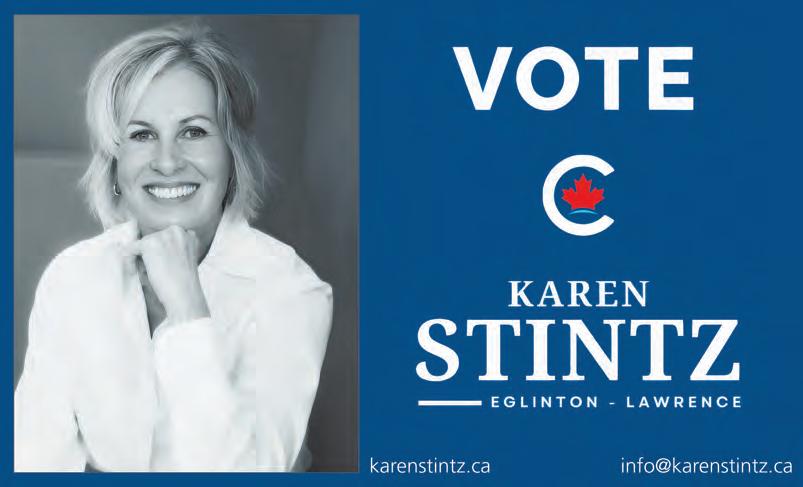

Spring in Ontario isn’t just a season — it’s a spectacle. For a fleeting few weeks between late April and early May, the province is draped in delicate clouds of pink and white as cherry blossoms burst into bloom. Check out Ontario’s best sakura spots.
1. Edwards Gardens, Toronto: Less crowded and more refined this North York oasis, beside the Toronto Botanical Garden, features blooms near the water fountain and courtyard.
2. High Park, Toronto: The OG of Toronto’s cherry Sakura scene. With trees gifted by Tokyo in 1959 and more from the Sakura Project, this is the city’s largest blossom collection.




3. Major’s Hill Park, Ottawa: Cherry blossoms and tulips in one spot? Major’s Hill Park delivers a double feature of florals, all with the stunning backdrop of Notre Dame Cathedral.
4. Niagara Parks Botanical Gardens, Niagara: This 99acre garden paradise offers a dreamy cherry blossom display near its entrance in mid to late May. Explore the Victorian rose garden, herb garden and scenic trails for a full floral experience.
5. McFarland Park, Niagaraon-the-Lake: This is a hidden gem for springtime blooms. The trees near McFarland House and its charming tea room make for an elegant afternoon out of the city.
6. Spencer Smith Park, Burlington: This waterfront park, with its Japanese-inspired garden, is home to a grove of cherry blossom trees gifted from Itabashi, Japan.
7. Gairloch Gardens, Oakville: Elegant formal gardens, a peaceful pond and walking trails make Gairloch Gardens a perfect spot for cherry blossoms.
8. Bayfront Park, Hamilton: Sakura trees donated by Japan line the entrance of Bayfront Park, welcoming visitors approaching the waterfront with their delicate pink flowers.
9. The Arboretum, Guelph: The University of Guelph Arboretum, featuring 400 acres of plants, gardens, woodlands and meadows, comes alive in spring with a colorful display of pink blossoms. Lauren DiBenedetto
Dear Sangita: My sister is having an affair with a married man and it's completely ruining our relationship. I'll put it bluntly — I don't approve of her lifestyle. I think it's irresponsible and awful to interfere in another person's family/relationship like this. She sees it as a fun fling and says I'm worrying too much about it and it's not a big deal. I find it hard to be around her now because all I'm thinking about is her relationship choices. How do I manage this? I don't like feeling distant from her but I just can't approve of what she's doing. —Sinning sister
Dear Sinning: You 100 per cent should feel comfortable stepping away from your sister — you don’t want to be involved with any of this. You absolutely can tell your sister that it’s bothering you and, essentially, say, “Live the life you want to live, but I don’t appreciate it, don’t approve of it and don’t think it’s the right thing to

do” and then walk away. You’re siblings — when she gets through this phase, you’ll most likely come back together. Of course you don’t want to be distanced from your sister, but you do want to be distanced from what she’s doing. It’s OK to tell her, “I don’t want to be a part of all this. When you’re done with it, call me.”
Dear Sangita: I think my fiancé did something untrustworthy on
his friend's bachelor trip — and now I'm worried he'll do the same on his own bachelor trip. He travelled to Montreal with his friends and told me that they ended up hitting it off with a group of girls. One girl's name kept coming up, and when I pressed him on her, he got a little cagey and just said they were all hanging out as a group. I have this feeling that he did something he doesn't want to tell me, not nec-
essarily cheating, but not necessarily NOT cheating. He is otherwise so loving and loyal. Am I marrying a soon-to-be cheater?
Bachelor trip blues
Dear Blues: If you feel something did happen, there’s a good chance that something did. But bachelor parties are sometimes a bit of a grey area; not everyone knows what is or isn’t allowed. I remember my husband went on a golf trip for his, but if he had said they’re going to a strip club after, I don’t know how I would have reacted. Maybe I would have been comfortable with that, knowing it was just for the bachelor party. These kinds of events are just so hard to navigate. In your case, he has his own bachelor trip coming up soon, so this can be a discussion you can have ahead of time — setting boundaries in terms of what you are both OK with (or not). As for this situation, I don’t think you need to worry that you’re marry-
ing a cheater. If your fiancé has never given you a reason to doubt him until now, I think it’s OK to move on from this. You can use this situation as a basis for the conversation around setting some ground rules for his trip, but I don’t think you need to panic. He did, after all, willingly tell you about this woman — there may have been some behaviour you wouldn’t approve of, but that doesn’t mean cheating. Of course, if there have been red flags before, then that’s different. But if you know him, you love him and you trust him, this shouldn’t change that. Just have a frank discussion so it doesn’t happen again.
Have a relationship or life question for Sangita? Send it to advice@postcity.com.
SANGITA PATEL is our advice columnist and was previously a host on ET Canada.

Chelsea Muirhead is about to explode. The Toronto-born actor is making waves in the acting industry. After starring in 2023’s drama series Warrior, you’ll see her swapping the ring for the trauma room in Netflix’s new medical drama Pulse, premiering April 3 — making a successful jump from Hollywood North to Hollywood proper.
Growing up in Toronto, Muirhead always had big dreams. She honed her craft at Toronto Metropolitan University where she underwent the rigorous training of a conservatory program.
“I was in class from 6 a.m. until midnight some days,” Muirhead recalls. “Sometimes I’d sleep in the studio. It was blood, sweat, tears — all of the above.”
Despite the challenges, she’s never let her momentum slip. In her early career, she took on local indie projects, took part in

theatre productions and worked related but odd jobs — including a stint as an elf at Toronto’s Black Creek Pioneer Village.
Landing Pulse was a whirlwind — when Muirhead got a callback, she had to learn a fourpage scene just an hour before performing it.
“It was nerve-racking, but it
NAME: Chelsea Muirhead
FAVE T.O. VENUE:
Factory Theatre and Theatre Passe Muraille
GO-TO MEAL:
The peameal bacon sandwich at Paddinton’s Pump
FAVE THINGS TO DO:
Taking her dog Mowgli to the island, walking around High Park
was one of those moments where I had to trust myself,” she says. “The universe kind of tells you, ‘You’re ready for this.’ And once I got onto set, everybody was just so lovely. Everybody is cast so perfectly. We just had the best time shooting and figuring it all out together.”
What sets Pulse apart from
other medical dramas, according to Muirhead, is its balance of professional and personal stakes.
“A lot of times, medical shows are heavily focused on the medicine, which is very cool,” she explains, particularly referencing current hit drama The Pitt. “But something about Pulse brings out the vulnerability and reallife stories — not just of the patients, but of the doctors themselves. We get a really deep, personal look at what it’s like to live as a doctor and feel your way through your personal life, as well as the stress of work.”
Pulse’s authenticity is bolstered by a surgical expert on set.
“We had a real surgeon, Josh Choke, and an emergency room nurse, Rosa, who were our first point of contact to teach us the proper words, how to move, how to run but not rush,” Muirhead says. “It was a challenge, but it was very fulfilling. I’m such a nerd — I love learning new skills like that.”
Though her career has taken her across borders, Muirhead remains connected to Toronto. She recently appeared in Law & Order Toronto, fulfilling a “bucket list” dream. “Growing up watching Law & Order and seeing my name in the credits it was surreal,” she says. “I and all of my friends were auditioning for every character under the sun and hoping. To die on that show and be on that slab in my hometown felt like an honour.”
Now, Muirhead is dreaming of all that could come next — stepping onto the Broadway stage, performing Shakespeare in London or diving into intense roles.
“I would love to play an absolute psycho — some kind of Joker-type character,” she says and laughs. “Everything interests me — comedy, drama, action — I just want to keep learning and growing.”
—Sadaf Ahsan





By scoring the game-winning goal that won Canada our firstever medal in women’s soccer at the 2012 Olympics, Diana Matheson had already succeeded in putting our country on the map for the sport. But she decided there was more to be done — and in 2022, she spearheaded the launch of Canada’s first professional women’s soccer league. It’s finally here: the kickoff of the Northern Super League (NSL) happens in April, including a Toronto game on April 19. Ahead of the launch, we caught up with Diana to get the scoop on her gold medal–worthy romance with her wife, Anastasia Bucsis, former speed skating Olympian and current CBC Sports host and analyst.
How they met
We met at a Canadian Olympic foundation fundraiser. We had a great night, and following that, she texted and reached out several times, but I am a terrible texter and was a bit oblivious, and we kind of lost touch. I was probably smitten from the beginning, but she's very much heart first, while I’m very much a thinker, so I think it clicked for her sooner, and it took me longer to catch up. But we reconnected at the Milton velodrome, watching a friend, cyclist Georgia Simmerling, do a trial up there.
The wedding
We got married in Montana. She’s from Calgary, so we looked for some venues in and around the foothills of Alberta, but we have some friends that live in Montana, so we started looking around there too. We did the city hall wedding here in Toronto, just with friends and family. And then about a month later, on Aug. 31, 2023, we got married in Montana. Our sports friends are all over Canada and the U.S., so we wanted to try to bring everyone together. We had a golf event, a brewery event and then a beautiful ceremony at this river mountain venue just outside Missoula. We had our honeymoon a year later, after the Paris Olympics — we went to Croatia!
The secret to success
The first date
We count that as our first date. We actually had dinner with Georgia and her partner (Olympian Stephanie Labbé), and they ended up leaving early, so we ended up talking for hours. We looked back and later realized that it was on Feb. 14 — so unbeknownst to us, we had our first date on Valentine’s Day!
“Anastasia proposed — at some point, she called dibs on proposing!”
The proposal
Anastasia proposed — at some point, she called dibs on proposing! We had just gone out for a date to a favourite spot in the city and had some charcuterie and a nice glass of wine or two. She had arranged for my sister and her husband to come by our house while we were out, and she had them set up some beautiful flowers and candles up in our den at home. When we got home, she called me upstairs in a weird tone that I couldn’t place. I was like, am I in trouble? I went upstairs, and she was down on one knee.
I think we're both just really good at supporting each other. We're both ambitious and have dreams within work and our careers, and we support each other in doing those things but also just love spending time together, as well, and we're looking forward to the many years ahead.
Balancing careers and a relationship
Coming from high performance sport for both of us, when you're chasing a dream, that balance is sort of a myth. You do the best you can! We’ve had the busiest two and a half years of our lives, with Anastasia building her career and hosting the Olympic Games on CBC, and with us building the NSL and all the stress and uncertainty that comes with that. But we've just tried to get better at managing that stress and finding the things that we can do together that bring us energy, but in a way that feels restful and restorative.
The future together
We plan on expanding our family, whatever that looks like. And right now we’ve got a small condo in Toronto. Maybe in the future we’ll have a little bit more of a patch of land somewhere that we can build up as well.



















Our guide brings together some of the city’s finest camps and programs. It’s our hope that the guide will help your children achieve their dreams, make new friends and gain an appreciation of nature.
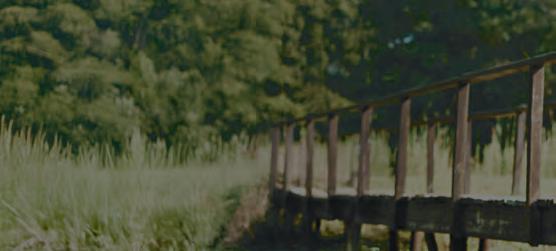

Debate Camp provides an engaging, skills-enrichment summer opportunity for students in grades 4 through 10. In 2025 we are excited to once again bring Debate Camp to the Toronto area, with 2 locations - and 5 weeks of day camp to choose from! Our day camps are located in Forest Hill and Lawrence Park area (with daily bus r/t from Richmond Hill available in August). Also new in 2025 is our Ottawa Overnight Debate Camp - with accompanied train service r/t from Union Station. We offer a well-loved program in public speaking, parliamentary debate and Model United Nations - open to all ability levels. Daily schedule also includes organized games, impromptu speaking, drama and interactive activities to ensure camp retains a fun and balanced approach to learning. Important and timeless skills for this generation. Join us in 2025!



Prestige School’s Summer Camp Program is just the fun, activity-filled, yet educational summer that your children are looking for! Our camp, which offers a wide variety of exciting activities that keep all kids engaged, educated, and entertained, starts on July 2nd and ends on August 22nd, 2025. Our sports program includes Outdoor Games, Basketball, Volleyball, and Soccer. We also offer educational programs such as English, French studies, Spanish, English as a Second Language, and Logic Boosters. We also provide activities such as Fun Science, Computer Design, Computer Animation and 3D Modelling, Drawing, Painting, Sculpting, Chess, Baking and Nutrition. Campers attend exciting weekly Field Trips throughout the summer and visits to the Swimming Pool/Splash pad. The camp runs from Monday - Friday from 8am - 6pm. Hot lunch is provided daily. Door-to-door transportation is available. Summer School Credit Courses for gr. 9-12 now offered.
For 8 to 14 year old campers, an unforgettable overnight camp experience on our own private lake! Days are filled with swimming, paddling, crafting and so much more, including our legendary campfires, campwide games, theme days and canoe trips. Our "Outdoor Skills" and "Leader In Training" programs give 15 and 16 year olds the opportunity to earn OSSD credits while learning valuable outdoor and leadership skills. If your 6 to 9 year old camper is ready for an overnight camp experience, PeeWee Camp is ready for them! Experienced staff welcome campers to a fun and safe introduction to camping at Big Canoe in this 5-day stay. Session 1 June 30 (12 days), Lego Robotics Camp July 6 (5 days), Session 2 July 14 (12 days), PeeWee July 25 (5 days), Session 3A July 29 (5 days), Session 3B August 3 (6 days), Session 4 August 12 (12 days), LIT, Outdoor Skills - July and August Sessions.




2 Convenient Locations Toronto Campus: 21 Eddfield Avenue (Sheppard & Yonge) Richmond Hill Campus: 11 Headdon Gate (Bathurst & Major Mackenzie) 416-250-0648


CAMP TYPE: Day Camp
AGE RANGE: 3-19 years
TOTAL ENROLMENT: 50-70
CAMPER/STAFF RATIO: Varies
SESSION LENGTH: July & August
SESSION COST: $430 per week

CAMP DIRECTOR: Olga Margold
CONTACT: 416-250-0648 prestigeprivateschool.ca
CAMP TYPE: Overnight/Academic Camp AGE RANGE: 8-16 TOTAL ENROLMENT: 65 CAMPER/STAFF RATIO: 6:1
COST: $800/week

CAMP DIRECTOR: Ian McTavish
705-645-4963 (summer) or 416-722-3625 (winter) • campbigcanoe.ca












Since 1962, we have been creating unforgettable summer memories for thousands of children as one of Toronto's longest-running day camps. Bayview Glen offers enriched, age-appropriate programs for campers ages 4-6, specialty camps for campers 7-12, and a leadership program for campers 13-15. We also offer an inclusion program for campers requiring additional support. Single- and multi-week registration options are available. Join us on the centrally located, secure, and air-conditioned campus of Bayview Glen School, where campers can enjoy sports fields, a theatre, tech/robotics labs, art studios, gymnasiums, outdoor spaces, and more. Specialty camps include art, basketball, soccer, musical theatre, dance, magic, coding, and robotics. We even offer off-site specialty camps like sailing and lake days! Convenient bus depot pick-up and drop-off points are located throughout the GTA! Make this summer one to remember with us! CAMP



RANGE: 4-16 yrs TOTAL ENROLMENT: 200 CAMPER/STAFF RATIO: 3:1
SESSION LENGTH: Varies
Varies
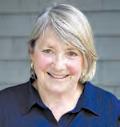
Since 1925 Tanamakoon girls have returned year after year to develop life time skills and friendships in Ontario's pristine Algonquin Park. Parents can feel secure with the knowledge that we pride ourselves in hiring compassionate, caring and highly skilled staff. Tanamakoon preserves traditional camp values while promoting self esteem in all campers. Developing character, fostering compassion, learning respect for others and the environment and instilling a sense of taking responsibility for themselves are part of everyday life at Tanamakoon. Tanamakoon will provide your daughter with an exceptional experience that will develop skills she can use throughout the rest of her life. Algonquin Park provides the perfect natural environment that gives girls permission to “unplug” and to lead a simpler more gentle life. 3 day Kindercamp, 6 day Minicamp and 2 and 4 week sessions CAMP TYPE: Overnight Camp












“Where Growth and Fun Walk Hand in Hand"
Girls 4-16 Years Sessions:
- Kindercamp Girls 4-6 years
- Mini Camp 6 day sessions
- Two week + Four week options









The 10 hottest reservations in and around town
Dopamina Mediterranean-Asian fusion with punchy flavours and refreshing martinis.
Grizzly Bar
Shrinking Violet
Creative cocktails and snacks permeate the menu at this dream-like Bloorcourt spot.
Tantxo
Bonito’s on Ossington is the retro hangout you didn’t know you needed. A former laundromat now decked out with '70s wood panelling and sports memorabilia, this spot serves up a playful mix of Latin and Korean-inspired comfort food like hamachi ceviche and stuffed chicken wings.
The new St. Lawrence Market North building is now open, bringing the iconic Saturday Farmer’s Market back to 92 Front St. The five-storey space is a sleek upgrade from its temporary setup, featuring a bustling Market Hall, green roof and plenty of parking. Although vendors continue to bring seasonal produce, the new building’s modern amenities ensure an elevated experience for both shoppers and local businesses.
Tha Phae Tavern, the latest
from Pai and Kiin’s Nuit and Jeff Regular, has landed in Toronto and it’s anything but your average Thai restaurant. Killer cocktails, crave-worthy Thai bites with a twist and private karaoke rooms where you can let loose and sing like no one’s watching (even if they are). This is the spot to hang out, eat, drink and do it all again tomorrow.
Grizzly Bar on Queen Street
West is Toronto’s first Canadian-themed bar, serving up Ontario wings in maplewhisky sauce, Quebec bison burgers and Montreal smoked meat. With local drinks, Canadian tunes and comedy from Second City, it’s the ultimate spot to celebrate all things Canada.
The masterminds behind Toronto’s Delysees just unveiled Campaniae, a champagne lounge with French Moroccan vibes. The menu features a va-
riety of Moroccan-inspired shareable plates, desserts reimagined as cocktails and champagne from the finest producers.
The team behind Papi Chulo’s and Aleria, is set to drop two must-visit spots this spring: Papi & Rosita’s and Little Ese With tacos, pizza and pasta, Papi & Rosita’s promises a high-energy vibe across two levels, and Little Ese is poised to be Queen West’s go-to hangout for shareables and patio fun.
Cassius Cucina Contemporanea is set to redefine King West’s dining scene when it opens in May. Unapologetically original, the space combines authentic Italian cuisine with striking design, shifting effortlessly from refined dining to a high-energy social hub, bringing an entirely new vibe to the neighbourhood.
Greta Solomon’s, the beloved Leslieville bistro that captured hearts for nearly a decade, has closed its doors for good. Owner Darlene Mitchell confirmed the news on Instagram, expressing pride in the restaurant’s legacy. Since 2016, the French-inspired spot has been known for its intimate atmosphere and creative dishes.
After 32 years, Golden Wheat Bakery in Little Italy has shuttered its doors permanently. Known for its breads and Portuguese desserts, the familyowned bakery bid farewell, thanking loyal customers and employees. The second location on Rogers Road remains open, as rents continue to pressure small businesses across Toronto.
Argentine steak house with mouth-watering cuts, plus $20 steak frites deals.
Nobu
Continues to impress with luxurious dining and cutting-edge dishes.
Jamil’s Chaat House
Serves up authentic Pakistani-inspired chaat and creative dishes.
Tha Phae Tavern Rumeli This new spot with regal decor serves upscale Turkish cuisine.
Linny’s Chef David Schwartz’s Linny’s blends nostalgia and theatre with a unique steak-deli twist.
Medusa
A Greek feast awaits at Medusa, transporting you straight to the Aegean with every bite.





























We're smoking the competition in a delicious deli showdown: Centre Street Deli, rooted in Montreal’s Snowdon Deli, faces SumiLicious, born from a Schwartz’s Deli vet (yes, the Céline Dion one!). Anthony Rose, of Fat Pasha, and Vito Marinucci, of 7 Numbers, judge Toronto’s top deli favourites.
5631 Steeles Ave. E., #5, Scarborough Established: 2018

SumiLicious: Anthony: 3.25/5, Vito: 4/5
Centre Street Deli: Anthony: 3.25/5, Vito: 3.5/5
Vito and Anthony had different takes on the coleslaw. Anthony thought Centre Street’s was “classic” but a bit “pedestrian,” preferring the crunch and pickle kick in SumiLicious. Vito liked the peppery, pickley flavour at SumiLicious and found it more exciting.

SumiLicious: Anthony: 3.5/5, Vito: 4/5
Centre Street Deli: Anthony: 5/5, Vito: 4.5/5
When it came to the fries, Anthony loved the Montreal-style ones from Centre Street Deli – crispy and soft. He thought they had that perfect old-school vibe, and Vito agreed. Vito also liked the spice on the fries from SumiLicious even if Anthony wasn’t a fan of the starchiness. They agreed on one thing – fries are always a good idea.
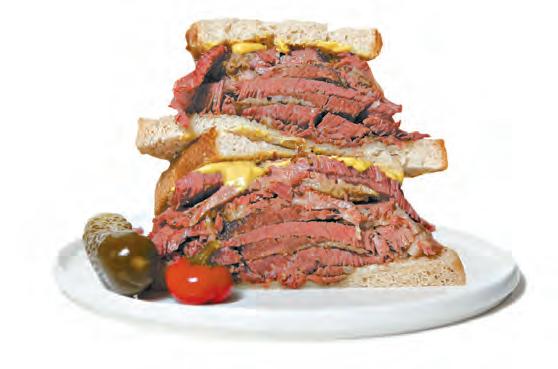
SumiLicious: Anthony: 8/10, Vito: 8.5/10
Centre Street Deli: Anthony: 7.5/10, Vito: 6.5/10
Vito thought Centre Street’s smoked meat was too thin, while Anthony found it a bit underwhelming. On the flip side, Vito loved the hand-cut brisket at SumiLicious, calling it perfectly balanced, and Anthony was all about the well-sliced meat and spices. When it came to pickles, both agreed SumiLicious nailed the crunch and garlic, while Centre Street’s were more classic.


1136 Centre St., Thornhill Established: 1988


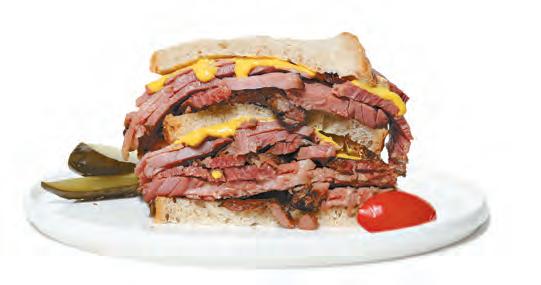


Toronto’s dining scene never slows down and neither does food influencer Rick Silver (@dicksworld). He’s back to deliver more of his unfiltered critiques on four spots that are either living up to the hype or falling flat. From hype-worthy hits to disappointing misses, Rick offers honest, no-holds-barred opinions. When Rick speaks, you listen.
1. Miznon: This Middle Eastern spot serves the fluffiest pita sandwiches in town. Try the hummus with pitas and a bag of brisket loaded with meat and onions. Even if you're not a fan of cauliflower, the roasted mini head is a must-try. Multiple locations, including 1235 Bay St.
The Rating: 9.1/10
Final Bite: If you love a good pita, this place is a must-try.
The Rating: 7.3/10
Final Bite: Next time, go for the special.
3. Crudo: Epic Italian sandwiches, made hot and fresh with classic toppings, served from a cozy little spot in an Etobicoke plaza. The moment you bite into one, you’ll understand why it’s worth both the drive and the wait — trust me, it really is. But fair warning: the line can get long, and you might spend half an hour just trying to find a parking spot! 1451 Royal York Rd.
CAULI CHIC
It was at Miznon
Paris that the nowiconic roasted cauliflower pita was introduced.
2. Sisters & Co: People rave about Sisters & Co, but here’s my take: the eggs were perfect, and the sourdough was nice, but the bacon and potatoes, though seasoned well, were deep-fried and underwhelming. Should’ve gone for the apple crumble pancake special — my bad. 887 Dundas St. W., 7725 Birchmount Rd.
Tips from Jeremy Diamond and Sandra Zisckind of Diamond & Diamond Lawyers
JEREMY DIAMOND
Jeremy Diamond is a lawyer and member of both Ontario and Florida Bars. Jeremy practices in the area of Plaintiff personal injury litigation.
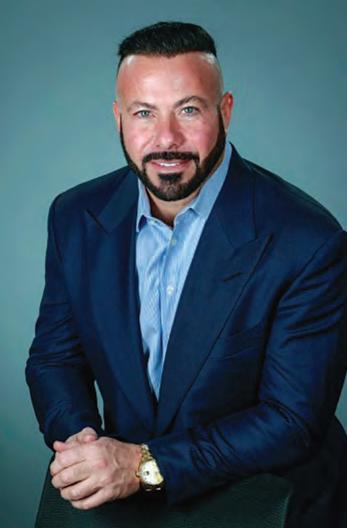
The Rating: 9.7/10
Final Bite: Prepare to wait, or skip it altogether.
4. The Burger Shack: This iconic flame-grilled burger spot never misses. The 50-year-old grill adds flavours few other burger joints can match. Fresh-cut fries complete the package. The decor, straight out of the '70s, is untouched and never needs, nor should ever get, an update. 233 Eglinton Ave. W.
The Rating: 10/10
Final Bite: Don’t take it to go — stay and get the full experience.
As electric vehicles (EVs) gain popularity on Canadian roads, understanding the unique safety considerations associated with them becomes essential. Diamond & Diamond Lawyers, Canada’s largest personal injury law firm, is committed to promoting safe driving practices and ensuring the community is informed about the challenges and benefits of EV technology. The firm’s safety ambassador, Cam Woolley, discusses a few things that you need to know.
Electric vehicles are equipped with advanced safety features designed to protect both drivers and pedestrians. Many EVs include larger crumple zones, electronic stability control, and regenerative braking systems that enhance overall safety.
One notable safety consideration for EVs is their quiet operation. While this
contributes to a more pleasant driving experience, it poses risks for pedestrians and cyclists who may not hear an approaching vehicle.
“Drivers and pedestrians need to be extra vigilant,” Woolley emphasizes. “Electric vehicles also have impressive power and acceleration, making it essential for drivers to stay aware of their surroundings, especially in urban areas or near crosswalks.” On a recent episode of the Know Your Rights podcast, Cam d iscusses an incident where a group of kids drove an electric vehicle into a house because they didn’t understand the power these vehicles possess.
Charging infrastructure is another critical aspect of EV safety. As more charging stations appear across Canada, following safety guidelines while charging becomes essential.
“Always use designated charging stations and avoid using extension cords that aren’t rated for EV charg-
ing,” Woolley advises. “Improper charging can lead to overheating and potential fire hazards.”
Additionally, drivers should ensure that charging stations are well-maintained and that electrical outlets are safe and up to code.
In the event of an accident, knowing how to handle an electric vehicle can differ from traditional gasoline-powered cars. Emergency responders are increasingly trained to deal with EVspecific scenarios, such as managing high-voltage batteries.
“Understanding how to respond in an emergency is vital for both drivers and first responders,” Woolley states. “Being prepared can make a significant difference in critical situations.”
“Proper maintenance not only enhances safety but also extends the lifespan of your vehicle,” Woolley notes. “Make sure to consult the owner’s manual and follow manufacturer recommendations.”
For questions about vehicle safety or personal injury law, the Diamond & Diamond team is available to help. Safety is a priority, and they are dedicated to ensuring the community has the information and support needed on the road. If you or a loved one have been injured in an accident, contact the firm anytime at 1-800-567-HURT.

Regular maintenance is crucial for all vehicles, and electric vehicles are no exception. Although EVs typically require less frequent maintenance than their gasoline counterparts, drivers should still pay attention to key components such as the battery, brakes, and tires.
Few desserts are as fun to play with as they are to eat, but Savorology Artisan Bakery’s latest viral sensation does just that in the most adorable way.
The shop has gone viral for its mochi cakes inspired by Jellycat — the irresistibly cute plushies known for their smiley faces. These mochi cakes feature a stretchy mochi exterior and a creamy chiffon cake interior, offering a light, nottoo-sweet treat in a variety of rotating flavours. Right now, the bakery is serving up strawberry shortcake, pistachio tiramisù and boba milk tea Jellycat mochi cakes.
“I fell in love with Jellycat,” says Savorology owner Aimee Zhao. “I think they are so adorable and therapeutic, and I can’t stop looking at them.”
This isn’t the first time Savorology has gone viral for their mochi creations. After a soft opening just before the pandemic lockdowns, Zhao spent the downtime perfecting her all-natural, preservative-free mochi. Unlike other spots, she takes a unique ap-

One
proach by filling the mochi with whipped cream and fresh fruit, inspired by the style often found at Chinese bakeries.
“When I found this bakery, I wanted to create something special that would stand out from the others,” Zhao says.
She did that by first cre-
ating the mochi bubbles, a mini mousse cake wrapped in a rice dough casing, which quickly became and continues to be a bestseller.
But the innovation didn’t stop there. Zhao then introduced mochi-wrapped gelato, a creation that’s gone viral and captured the attention of des-
sert lovers. Inside the store, customers can even watch as their desserts are expertly wrapped in the handmade casings, adding to the experience.
Zhao’s constant innovation led to smiley-faced mochi cakes, launched last year, and the limited-time yomogi mochi, made with a Japanese plant for a spring-inspired flavour.
Zhao assures it won’t be the end of her innovative, mochifilled ideas, and she already has plans for spring-inspired jelly cakes to align with upcoming holidays.
“Life is a holiday after holiday. I always try new things and launch new things for holidays, so that’s my life,” she says, adding that she will always enjoy the Jellycat cakes. “Ever since I started making jelly cakes, when I look at the smiley faces, I still feel joy. I think it’s magic.”
Find Savorolgy Artisan Bakery at 3621 Hwy. 7, Unit 120, Markham.
—Megan Gallant
After starting out as a pop-up concept at the beginning of 2024, Jamil’s Chaat House has found a permanent home inside a lemon yellow building on Queen Street West
“Jamil's highlights overlooked or underrated dishes that are often found at Desi restaurants, but rarely ordered by people outside of the diaspora,” says Emma Tanaka, who co-founded Jamil’s alongside Jalil Bokhari. “The intent is to recontextualize them within Toronto's food culture — evoking nostalgia for those familiar with the dishes and a sense of discovery for others.”
On the menu, you won’t find any butter chicken, despite what some might expect. Straightforward and minimal-

ist, it leans vegetarian and is a curated collection of generational Pakistani recipes executed by head chef Eric MacDonald. Chaat, a popular category of savoury snacks in South Asian cuisine, is the star
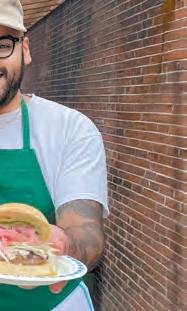
of the menu — alongside other Pakistani-inspired small plates and mains.
Meat dishes include the beef seekh kebab, done with marinated onion and cumin, and the lamb nihari served
with Desi chili crisp, cinnamon and ginger. You can also try weekly specials, which, most recently, have included a seared maitake mushroom and rotating seasonal achaars.


And, although Jamil’s is now a permanent fixture on Queen Street West, it plans to honour
“We are so grateful for the many restaurants that opened their doors for us. Now that we have a permanent home, the long-term intent is to extend the pop-up spirit to others,” Tanaka says. “We aim to play host to travelling chefs and winemakers who we admire in the industry.”
Jamil’s Chaat House is located at 1086 Queen St. W. —Christine Roberti



Dishes are served tapas-style
After 13 years of luxury French desserts, Delysées has opened its first restaurant, Campaniae, a French Moroccan Champagne bar in Yorkdale mall, exclusively for high-end brand LVMH. Designed by co-owner Khariz Naggar, the space features a Middle Eastern–inspired luxe atmosphere. Custom chandeliers and a wall of 1,200 hand-placed 24-karat gold leaves complete the look.
“Khariz wanted to create a space that’s extremely different from anything in the mall,” says Fred Naggar, who co-owns the restaurant with his wife.
The menu mirrors its luxurious vibe, offering tapas inspired by Moroccan flavours. Currently in the limited menu, guests will find light, modern plates, like merguez couscous with sweet vegetables. Other dishes include salads, sea bass with tabouleh and Moroccan beef cigars. For dessert, Campaniae serves Delysées’s world-class treats, including a Middle Eastern–inspired crispy Egyptian kunafa.
The Champagne bar offers a selection of LVMH Group brands, including Don Pérignon, Moët & Chandon, Veuve Clicquot and Volcan, among others. While Campaniae marks a new chapter for Delysées, the luxury boutique brand is expanding, with new locations in Vancouver and Montreal, by the end of the year.





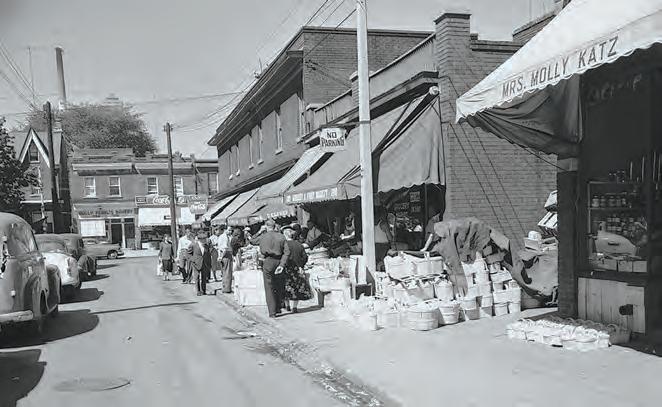

Before you go... take a look at how much our city has changed over the years. 1964 vs. 2025 1950 vs. 2025 1964 vs. 2025





















































As the weather w through our beau to refresh your c i j ung on a ton Wayy! arms up, take a stroll tiful neighbourhood loset, grab drinks i on a pat o, enjoy sculptures, get yo done, and more! with a fresh new and memorable e our stunn ng art ur nails and hair Kickstart the season look, delicious eats, xperiences.










































